#i feel like its pretty standard to think of characters we like as part of our groups
Note
Hi, I want to ask your opinion on something. You made a post that said changing the Winx's races is bad. I agree that it's not okay but I have a question about Helia. I thought he was Native American when I was a child but you've said he's Asian. Is it wrong to think he's Native American?
I had to think about how to answer this for a while tbh! Sorry for the late reply
Anyway, I probably could answer this with a simple yes or no but I really feel like I should explain my answer.
I'm pretty sure you're referencing this post! Anyway, the biggest issue with race changing the canon characters of color is that when you do it, you're participating in erasure. Again, it's not more representation to, for example, make Flora asian - it's erasure because you're intentionally erasing her being latina. Now like I said, I don't have an issue with like,, children not noticing their canon races or ethnicities. It's perfectly fine if a little kid sees characters as something else! The problem is grown adults ignoring and erasing their canon races.
When it comes to Helia specifically, he is very much coded as asian, specifically east asian. I want to clarify that it's not explicitly canon. Rainbow has never stated what race he's supposed to represent and they've never said if he was based on a real person. We don't even know what planet he's actually from! So his race is all coding. However, that coding is still,,, fairly obvious. And I specifically want to touch on how Rainbow depicts their east asian characters versus their indigenous characters.
Most of their east asian characters have either dark blue, black, or brown hair and more narrow eyes. Like,, that's their go-to when trying to make a character Noticeably asian. They're also fond of putting their asian characters in traditional clothing (like qi pao or hanfu) rather than casual clothing. I added Helia at the very bottom so you can see how he compares to other, canonically asian characters.

While Rainbow has absolutely depicted asian characters in offensive ways (espero...), it's usually pretty respectful. Meanwhile,,, their depiction of indigenous characters is... anything but.
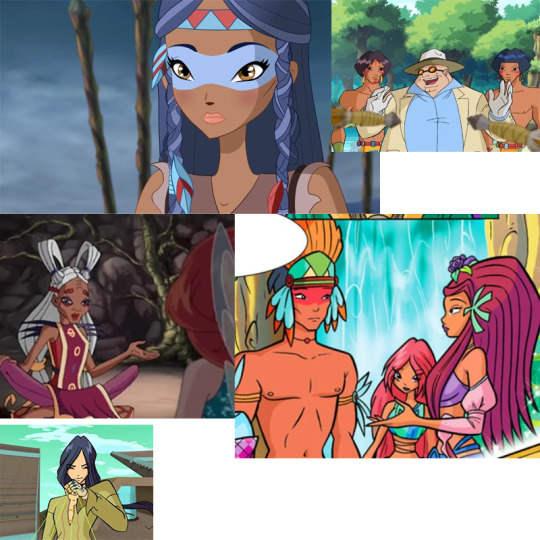
Like before, I put a picture of Helia so you can compare him to the canonically indigenous characters. As you can see here, their depiction of indigenous characters is,, extremely racist! It follows a lot of racist stereotypes like red skin, face paint, headdress, feathers, etc. Just,,, all around Not Good. And you'll notice that Helia doesn't really "fit in" visually. That's not to say that he has to look like that to be indigenous but remember that this is an animated show with intentional designs made by white people. If he was meant to be seen as indigenous, he would likely share more characteristics with these characters (like having darker, red-toned skin). Again, their depiction of indigenous characters is extremely racist. I don't think there's a single indigenous character in winx that doesn't look like a walking stereotype out of an old cowboy film. Unfortunately, Helia would absolutely look different and more like those racist designs if he was meant to be indigenous.
Now, to actually answer your question. Is it okay to see Helia as indigenous, and specifically indigenous to the americas? Well... as Helia's racial coding is still just coding and not explicit, it's not a crime if you don't see him as asian. Like,, while I do absolutely think he was meant to be seen as asian, it's still technically ambiguous enough that it's not a Bad thing if you don't see him as such.
That said, you need to be extremely careful with how you think of and portray Helia as indigenous. I've talked before about Rainbow including quite a few stereotypes about east asian men with Helia, and unfortunately, most if not all of them, can also apply to indigenous men. For example, Helia is calmer and wise (often shown to give advice in poetic ways), connected to nature (ie, birds, plants, Flora), frequently meditates, etc. These are all common stereotypes for indigenous men. I'd actually recommend reading this wikipedia article!
Anyway, seeing him as indigenous isn't inherently wrong, but there's absolutely a chance that you're picking up on indigenous stereotyping rather than coding or a headcanon. Like the long hair, connection to nature, the pacifist comment, the weird and kind of cryptic one-liners he occasionally has... Unfortunately, a lot of the indigenous!Helia headcanons/redesigns I've seen have been really racist. And the common reasoning for why they think he's indigenous often comes down to these common stereotypes.
So like,,, god I know this is long but honestly the answer is complicated. It's not a simple yes or no. It really, really depends on why you think he's indigenous. Like. Just ask yourself yknow? Why do you think this? Think of an actual reason that isn't just "vibes". And if you're creating any kind of content, even if it's just daydreaming tbh, how are you depicting him? Is there even the slightest hint of a stereotypical depiction? (And again, please research stereotypical depictions because there are a lot and quite a few contradict each other)
If you're confident that you're not stereotyping him, then honestly, it's not that bad to see him as indigenous. I do ask that you try to see and understand him being asian coded, as I do think that's important, regardless of whether or not it's in your face explicit. However, it's not like. a crime if you don't see him as asian. Just be very, very, Very careful with how you think of and portray indigenous!Helia.
Also,,, I didn't know quite how to fit this into the rest of the post but,, while it's not Bad for you to not see Helia as asian, you should think about why that is. For example, there are still a lot of people in the fandom who don't see Nabu as asian, despite his coding being extremely in your face and honestly canon at this point. But because he has darker skin, he's from Andros, and he was with Aisha, a lot of people assumed he was black. That's not inherently a bad thing, but some of those people get really mad when others point out that he's very much south asian which,,, is a bad thing. I understand the feeling of losing rep and wanting to protect that, but you shouldn't bulldoze other groups to do it.
I'm not sure what your opinion of asian Helia is, but if you're like,, against him being asian or refuse to see that very intentional coding just because you really like the idea of him being indigenous,, you should think about that and reassess things.
#long post#sorry but i feel like its important enough to not put under a read more#winx helia#answered#if anyone here is indigenous or asian and you want to chime in please do so!#like im asian so i can only speak on this from that point of view#so if anyone is indigenous and wants to speak on this matter feel free!#standard if youre white dont add on disclaimer#this is not your discussion#but id love to hear thoughts on this from someone who is indigenous#like. if you watched winx as a kid did you think he was indigenous? or do you think that now?#i feel like its pretty standard to think of characters we like as part of our groups#like i always thought riven and tecna were asian because of that#honestly if winx had more indigenous characters that didnt have racist designs id be a lot more on board#but literally all of their indigenous characters are extremely racist stereotypes#:(#besides the fact that helia does have actual asian coding. i think thats a big reason why i could never fully get behind-#him being indigenous because like... have you SEEN their indigenous characters???#goddamn#also unrelated but the people who say helia cant be asian just because his name is greek like do you think musa is a chinese name adhg
6 notes
·
View notes
Text
Dead cabin guy and his technicolor dreamcoat have haunted me since the wardrobe reveal in season two, and today im going to make it everyone's problem.
Travis wears the coat first. He and Natalie take the blessing and go out to look for Javi. Travis hallucinates (prophesies?) that Javi is dead and buried beneath the snow, but Natalie shows him it's only a fox. Travis finds the strange, mossy tree stump. The next day Travis has strong feelings about which direction is best to search for Javi in, and we don't see more of him until Nat reveals the bloody pants. Not that weird, all things considered. New season, new wardrobe additions. Hiking on a caloric deficit with PTSD, you'll probably hallucinate. Pretty standard stuff.
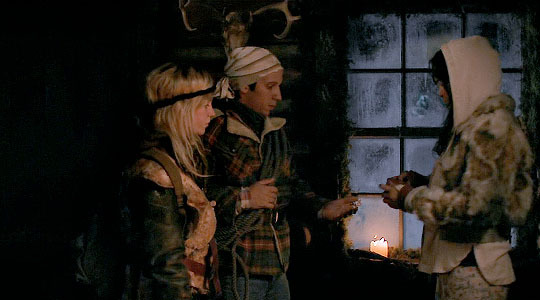
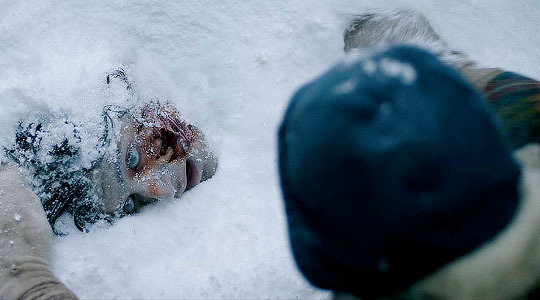
Then Nat wears the coat. She takes it to lay Jackie's bones to rest at the crash site, and while she wears it she sees (hallucinates? prophesies? I'm not sure!) the white moose that they'll later lose to the lake (ergo the hunt, ergo Javi dies for real but more on that later).

We get to Old Wounds, the hunting competition, and Lottie wears the coat now. You see where I'm going with this but just to be thorough: she enters the realm of death dreams, talks with Laura Lee, almost freezes to death.

Episode five. Melissa wears the coat. Maybe that's not important! Maybe it's just to show that they all share the wardrobe, and that the side characters are as equally All In This Together as the main characters are. Or it could mean something that a peripheral character, wearing important wardrobe, framed in antlers (not unlike Travis in 2.01), has the line "maybe he did die, and that's his ghost." It's a little suspicious, and at this point starts to feel like a pattern.
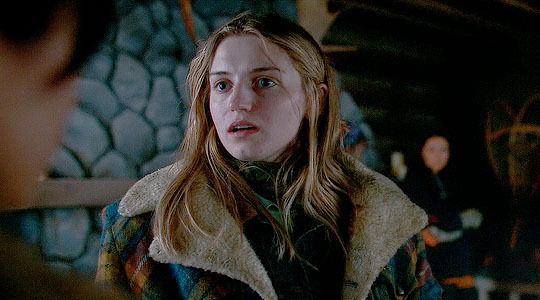
Who wears it next, who wore it best!? That's right baby, it's Paul! For his dreamworld drifter, hallucination hunk Coach Ben Scott. Nicholas Urfe himself. Ben spends almost all of his time in a dream, until *drumroll please* Paul, very pointedly, takes the coat and walks out the door. "Where do you think you are, Ben?" he puts the coat on. "You had to have known you couldn't stay here forever. [...] What matters now is that you aren't welcome here anymore." Following Paul means committing to death (to dream), and until interruption that's the choice Ben makes. Because letting Paul (and the coat) go would mean committing entirely to reality.
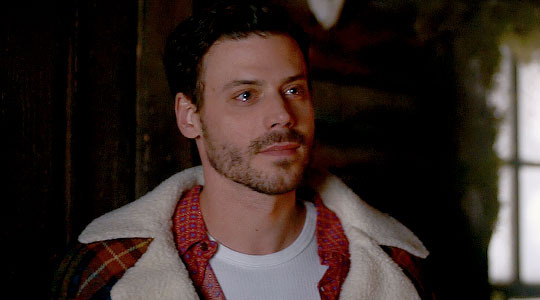
Of course, the pièce de résistance is something I didn't even notice until I went looking for it. The first dozen times I watched, I thought that after Lottie's beating Shauna brought her a blanket. "Lottie's cold." But she doesn't. She brings her the coat. Lottie is laying with it when, in a fever dream, she witnesses/hallucinates/prophesies parts of the hunt.
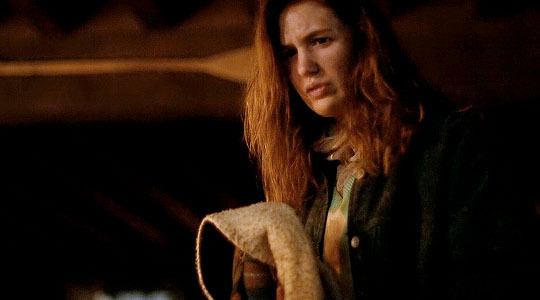
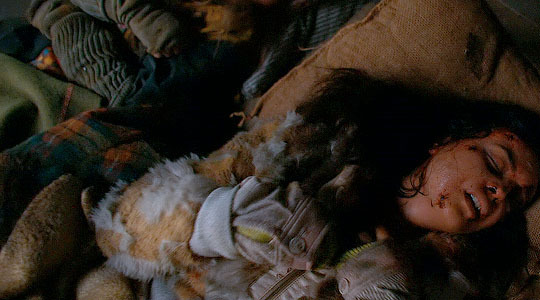
It's there again (on the back of the chair) when she sits by the fire and speaks for the wilderness, appointing Nat their queen. Ben watches, having woken from the dream himself, as they all bow to Natalie and leave reality behind for good.
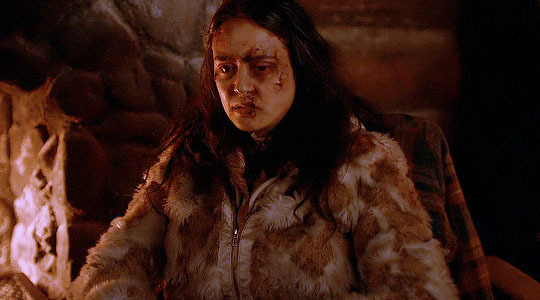
Of course, there are a lot of times when characters hallucinate strange things in the cabin while not wearing the coat, because they're all starving to death and traumatized. Mari. Shauna. Akilah. But in addition to that, it seems like a pattern worth noting that in each instance where a character wears the technicolor coat, the line between the real and the imagined seems to blur with more ease. Does dead cabin guy's technicolor dreamcoat help the Yellowjackets connect to the dream realm?
I'll be brief here with the biblical parallel: blah blah Joseph is the favorite son (you were always its favorite), his father gives him a technicolor coat (they're nothing special, they don't change color in the cold or anything). blah blah Joseph starts having prophetic dreams etc etc his jealous brothers throw Joseph down a pit (the wilderness chose) and bring his bloodstained coat back as false proof of his death (hanging on a branch. a couple miles back). You get my drift.
Does it mean anything? Who knows. But in a series where wardrobe is such an integral part of the storytelling, it felt worth paying attention to.
#yellowjackets#long post#travis martinez#lottie matthews#natalie scatorccio#melissa yellowjackets#paul yellowjackets#yellowjackets meta#javi martinez#shauna shipman#ben scott#akilah yellowjackets#mari yellowjackets
796 notes
·
View notes
Text
Mike around El and his very obvious Not-Crush
I want to start this off with a disclaimer: I interpret Mike as gay, so this analysis and the points I’ll bring up were written with this in mind. Now, let’s begin!
Since my first watch, I always thought it was kind of weird-funny how Mike never showed any kind of shyness towards El, unlike the other boys, who the audience and characters in-universe never think of as having a crush on El.
So they know El is a girl pretty early on, so when she first goes home with Mike and he lends her dry clothes, everyone freaks out when she tries to change right there in front of them. Pretty normal reaction for anyone, especially 12 year old boys! So, even in the middle of their freak out, Mike remains as the most well composed of the boys.
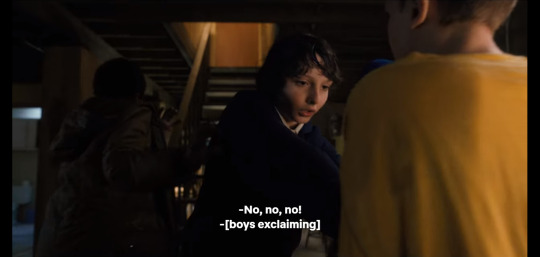
He doesn’t turn around, instead, is quick to stop her, even reaching out towards her arms, and explain she should change in the bathroom, because, well, privacy.
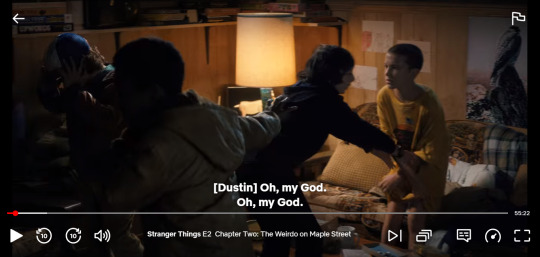
He even guides El towards the bathroom door, and we know that he tries to close it but El stops him. So, he understands, she’s still scared, and again, explains she can keep it mostly closed, leaving a small gap open so she feels safer.
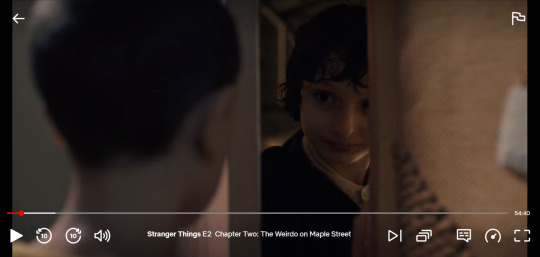
And then Mike goes to talk with Lucas and Dustin, who are still freaking out and talking about how she’s crazy, Lucas remarks “She tried to get naked” and Dustin makes the same hand gesture three times to really drive his point across.

And Mike? remains calm, really, his head is elsewhere, not stuck on the fact that a random, weird girl tried to change her clothes in front of them. Instead, his gears are turning, he’s already coming up with a plan so they can stay out of trouble, so she can be safe, and they can keep looking for Will: El has to stay the night, which Dustin finds insane.
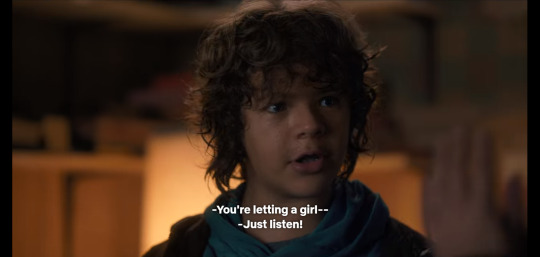
So, I first interpreted these kind of scenes as Mike being the more mature one of the boys. He NEVER goes “but she’s a girl!” the other characters are the ones who keep pointing that out to him. But really, Mike just treats her like a human being (and then he discovers she has superpowers).

And really, it’s funny how fascinating they keep finding this, but not surprising. Again, this is a normal reaction! that’s why I thought Mike was just the logical, more mature one. But that’s not really why: he just never made a distinction or a big fuss to separate THEM, boys, and El, a GIRL, until later on when people kept bringing that up. For Mike, El was just another kid just like them, he shows her his house, his TV, his toys, and has no issue getting close and just treating her like another friend.
There’s another reason that points to the Duffers being aware of what they’re trying to do. It’s subtle if you’re not looking for it, and really, it just flies under most people’s radars, including our own!
So we all know this scene, right?

The first instance of Mike being directly told he has to have a crush on her, because… he is nice to her, and she’s a girl. So, clearly. And then the bullies arrive, call Will homophobic slurs and Mike gets hurt, we know how that one goes. But you know the scene that plays directly before this one?
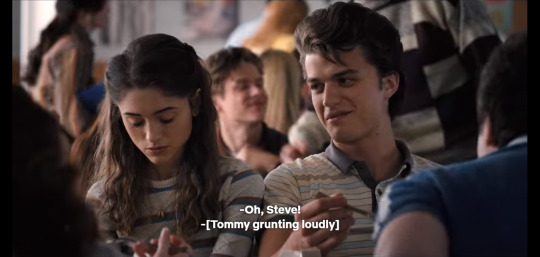
It’s Nancy. They’re making fun of her/shaming her because she hooked up with Steve, and we know how this plot goes too: the girl is slut-shamed and the boy is praised/admired for “getting” her. Nancy is worried because she left Barb alone and the next thing she knows, her friend is missing too. And she doesn’t feel guilty just because she dismissed Barb, she feels shame, and the kind of comment she’s receiving just adds to the guilt.
And all this? it’s part of heteronormativity too, and all its social standards of what’s expected of people based on their gender and sexuality. Nancy? A slut for hooking up with Steve. Will? probably killed for being gay! The boys? get bullied just as Lucas is hugging Mike, even if it’s part of a joke. Mike? must like El, because he is a boy who is nice to her, and she’s a girl! See where I’m going?
Next scene I’m going to talk about is this one:

And… It’s a great scene, really. But nothing about it is romantic. The boys help El dress up, and Mike even does her makeup and doesn’t mind! and, I’m sorry, but what 12 year old with a crush is NOT nervous to be that close? he’s just 100% concentrated in what he’s doing.
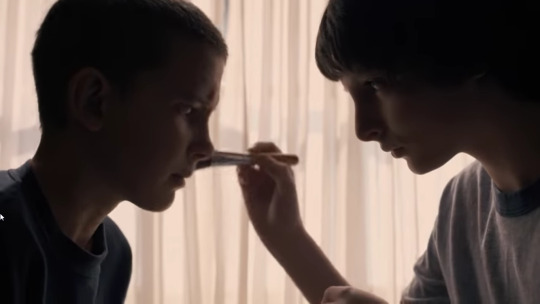
And then El comes out, full makeover, and Mike’s reaction is just very sweet and genuine. Dustin hesitates: “She looks…” and Mike immediately goes “pretty”. Now, some people interpret this scene as Mike finally Realizing El is Actually a Girl. I both agree and disagree.
I agree because that’s how it probably goes for Mike, just now in the sense most people expect. We should keep in mind the previous scenes: Mike is now aware of what other people think/what is expected of him. So he goes “pretty”, and oh, no, she’s a Girl, I can’t say that! they’re going to think I have a crush on her! “...pretty good” saved it:) but wait. That just makes it look even more like a crush! So maybe it is a crush, right? So, I think of this scene as the moment of Mike deciding that yeah, it must be a crush, making now a distinction between “friend” and “girl”.
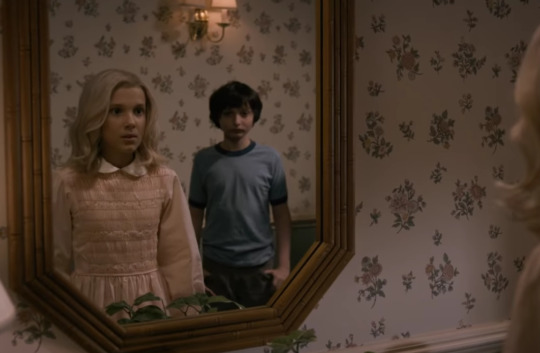
Other people have mentioned how particular this choice is: why would they have Mike next to El in the mirror? in the same scene where she’s presenting herself as Actually a Girl for the first time, wearing a pink dress, next to Mike, a Boy, who is even wearing blue! I don’t even think this analysis classifies as far-fetched for the same reason I mentioned earlier: the themes of the show are clear since the beginning, and plots like Nancy’s, Will’s, and later on El’s (and Max's) support that. Mike’s, however? it comes across as subtle (because really, it’s not), but it’s always been there, and the way the Wheelers are portrayed as a family confirms that too.
I don’t think he consciously makes the choice to pretend, more like it makes sense for him too, and the future events of the show just keep reinforcing this idea: she’s a girl with superpowers, who saves him and his friends many times, and people keep telling him he likes her! why wouldn’t he like her? And then there’s also survivor’s guilt but uhh… Let’s not go there, that’s another whole analysis.
It’s now time to talk about my least favorite topic: mlvn’s kisses. They have never been portrayed as genuinely romantic to me, even if I did think the snowball one was sweet when I first watched it. But that’s the thing: it’s cute, I guess, but it’s just there like a point you have to mark as done in a checklist. Entirely different to Lucas’ and Max’s scenes: Lucas hesitates when he asks Max to dance, and he’s clearly nervous, exhaling before asking, and their kiss is awkwardly endearing, genuine, and realistic for their age unlike anything in Mike and El’s relationship and… The beginning of s3 is proof of that. It’s almost like they’re kissing to prove a point: El is older now, and Mike is her boyfriend, they kiss like in the soap operas! (for Hopper’s and the audience’s dismay) and for Mike, well, El is his girlfriend, that’s what he’s supposed to do, right? (as he takes her hands off him).
Going back to the snowball, Mike plays the “date” role too perfectly. He does exactly what he should: he tells El she looks beautiful and asks her to dance, again, no hesitance. They dance and he kisses her… You guessed it, no hesitance. You could argue that it’s because it’s not their first thing, but the thing is… That one was a mess. It was out of nowhere, after talking about being family, as if Mike suddenly thought “yeah I think I should do this” and went for it. And… Did El even know what a kiss was?
Anyway, back to s3. They break up and all that, supernatural shit happens and oh! Mike tells a whole room of people that he loves El! how can that not be proof that he at least has a crush? well. Because Mike is not lying, just as he wasn’t lying when he called her pretty. He does love her, wants her to be safe because she’s his friend, and feels responsible for her safety (for many reasons). The thing is… Mike is aware of the Implications of the word.

He is being honest. He’s also confusing his feelings for romantic ones, just like he has since mid-s1. What’s the difference between the “ily” plot in s3 and in s4, then? wouldn’t that just be a repeat of the same?
No. This is a point of debate and I know we have different opinions on “When Did Mike Realize”, but for me, the contrast between this plot in s3 vs s4 is that s3 Mike is unaware, while in S4 he’s IS aware Throughout s3 (and before) he genuinely thinks his feelings are romantic. Until THIS happens
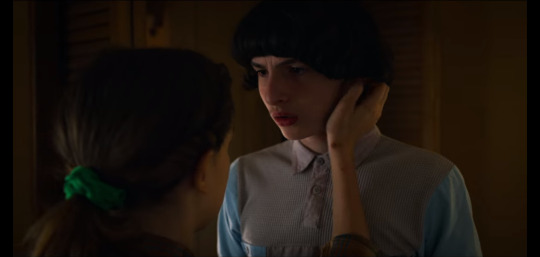

…and suddenly he’s confused, thinking it makes no sense. I choose to interpret it this way because it’s supported by the S3 script, which portrays Mike as confused and wondering what is wrong with him. This would’ve been a great moment to portray Mike as endearingly nervous/shy: they’ve been broken up and it seems like no one had said anything that hinted at a romantic relationship during that time. If Mike had romantic feelings for El, he should’ve been thrilled, but he doesn’t move, doesn’t close his eyes, doesn’t even smile. But it’s not disgust, it’s confusion. He’s starting to question things. To what degree? we do not know.
We can, however, infer from the events of S4 that he knows something.
The airport scene is as sad as it is funny, because this is probably the first instance in the whole show that we see Mike Wheeler acting nervous-shy in the way you would in front of a crush:
(Exhibit A)
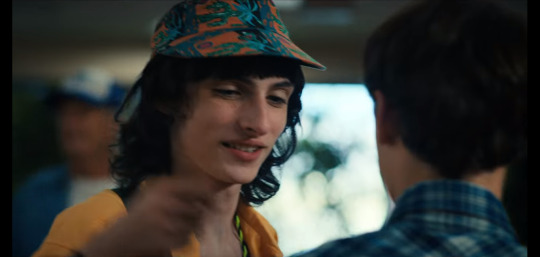
(Exhibit B)

ok, Mike, Will didn’t imply otherwise? are you trying to convince him or yourself?
(Exhibit C)
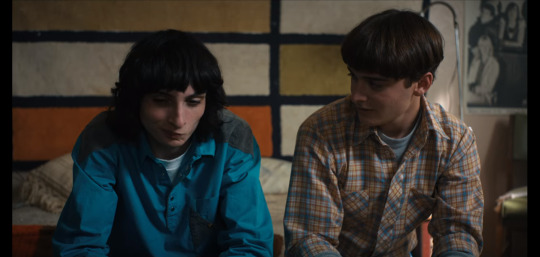
(Exhibit D)
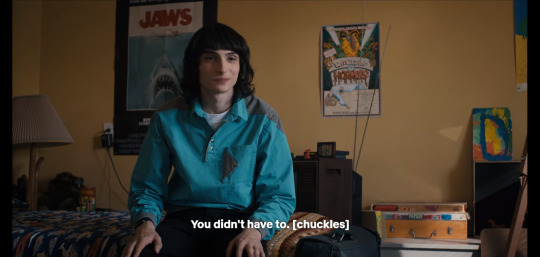
This whole conversation is so insane because everyone is so focused noticing Will’s crush that they miss Mike’s behavior? Mike, who during this conversation hesitates a lot, chooses his words carefully, exhales, you can see him swallow and just. He looks more nervous here than in the entirety of ALL his scenes with El on the show.
I could keep going on about s4, really, because there’s a lot to unpack there. But this is getting too long!
#byler#mike wheeler#will byers#anti mileven#gay mike wheeler#st analysis#stranger things#mike wheeler i know what you are#i spent way too long on this analysis please give it a like/rb if you read it or talk to me about your opinion#always happy to discuss about gay mike wheeler
378 notes
·
View notes
Text
So something that I often don't see people discuss is the manner in which the 9th and the 10th doctor's seasons are so intrinsically connected that it is almost impossible to understand a lot of key character arcs if you choose to skip it upon rewatch. The reason why I say this is because the moment you reach season 2, 10 is essentially the product of the development 9 achieves at the end of his season. To skip him, would mean that you also miss context as to the reason why Rose is so important and in turn, not understand the reason why their bond in particular is such a big part of the plot during the 10th's era.
Now bare with me, because I'm about to go off a bit lmao.
The first season of nuwho not only serves as an introduction to many of the key characters we see later on, such as: the Doctor, Rose, Jackie, Jack, Mickey, Harriet jones, etc. but it also serves as an introduction for the concept of the series as a whole. Prior to this, doctor who as a franchise had a reputation of being a geeky sci-fi show with no real wide spread appeal. Remaining as a niche interest to many, up until the reboot returned and reintroduced the show to a newer audience.
This is important to note because this is one of the main reasons why we see such a huge emphasis placed on the companions' lives in the reboot. Because RTD meant to expand the world of Doctor who and its audience, and by doing so, he strived to try a multitude of new plots that were otherwise never explored previously. This is why the romantic plotline of his season is so crucial to the story itself because he means to explore a facet of humanity not previously seen with the Doctor as a character. RTD essentially built this plot line from scratch, as the only other attempt at exploring such an angle was received negatively (The 8th Doctor's movie). So there's a degree of leniency that I give his writing In particular because like I said prior, he had no prior reference for exploring humanity to the degree in which the new series does.
The ninth doctor, when we meet him, is essentially a recluse. He is in a state of stagnation, implied to have been alone for some time after the war and it gives off the impression that he's no longer accustomed to being around people. He's often direct, rudely so and very standoffish to anyone that isn't immediately measuring up to his standards. This isn't to say that he isn't charming in his own way. He's sarcastic and when he tries, he can actually be very good with people. But the war still weighs heavily on his conscious and so, he views the world through the eyes of a soldier. Prioritizing the act of surviving rather than slowing down and actually taking the time to live life.
I mean, the man essentially meets Rose while blowing up her workplace and if that isn't concerning on its own merit than I don't know what is lmao.
A scene that sticks out to me the most about him in particular is when he looks at himself in the mirror for the first time. He notes that he has big ears, and from the manner in which he says it the implication that he perhaps has not seen himself in a long time is not lost to us. This coupled with the knowledge that he had indeed been seen traveling prior to meeting Rose, gives the phrase a more dark connotation that makes sense for his character.
I like to think that this indicates that the guilt of what he did to stop the war weighs so heavily on him that he could never bring himself to face his reflection. Because truly, to have gone so long without seeing yourself, not even in the reflection of a window or other surface is not something that is easy to do. Rather, it is something you have to go out of your way to do. Also it's important to note that his appearance is in fact a reflection of that weariness he feels. With his body, being older outwardly (appearing 40ish ) and his features being very sharp and serious. Even his hair is pretty short, much like how a soldier would keep it as a means of not wasting any time on worrying on something so inconvenient. His preference for darker colors and his constant outfit is also very noticably practical, not at all decorative like his prior bodies. This is purposeful, because it is what sets him apart from prior versions of the character and an easy way to visually see his most prominent traits.
Now with that out of the way, now I can discuss how 9 changes and what his relationship to Rose is like, so that one can better understand why Rose is such an important part of the Doctor's character.
From the moment the two meet, you can see he harbors an immediate curiosity towards her. Here they are, trapped in an elevator being attacked by a group of living mannequins and yet, Rose is almost unaffected.
That isn't to say she isn't afraid, she is, but her fear doesn't stop her from asking questions and demanding explanations. She doesn't shy away from him, rather she confronts him head on and even shows a level of concern for other people while she is actively the one in danger. It is enough to prompt him to ask her name, but not enough to involve her. Preferring to instead keep his distance.
It is not until another chance meeting that he gradually lets her in, allowing her to humor him with her curiosity and we see once more that he is in fact very good at socializing, but only with certain people. The reason why I stress this is because he often outwardly puts this front of coldness towards those that don't interest him. Rose was able to look past this front, and seems to look past his rather cold attitude towards other humans. He often stresses how inept they are, going on tangents about how they're nothing more than apes but she ignores it and tries to get at the core of the issue. That's why they mesh so well, because she is able to separate the fluff he inserts into his answers and take it for what it is. That isn't to say she's a doormat, she just knows when to pick her battles.
"do you know like we were saying? About the world revolving. It's like you're a kid, the first time they tell you that the world is turning and you just can't quite believe it cause everything looks like it's standing still. I can feel it. The turn of the earth. The ground beneath our feet is spinning 1,000 miles an hour and the entire planet is hurtling round the sun at 67,00 miles an hour. And I can feel it, we're falling through space you and me. Clinging to the skin of this tiny little world, and if we let go.. that's who I am. Now forget me, Rose Tyler"
He is describing the manner in which he views the world. Unlike how a kid is unable to comprehend the vast truths of how the world functions and remains naive of it for a period of time, he is a man that was never given that chance to be unaware of how it functions to an infuriating degree. He sees the world for how it is, dark, unforgiving and so direct. Everything is calculated so precisely and he can't even begin to comprehend why anyone would see the good in it as it's just that, a planet.
But that's why he finds humans so interesting. There's a part of him that holds onto that hope that it is something more, that perhaps he is missing out on a purpose behind all the darkness. That's why he is running amongst them, to find a reason behind their way of thinking. To experience the world through the eyes of the hypothetical child, rather than the adult who breaks the illusion.
Not only that, but this conversation also let's us in on how touch-deprived he is.
For it is in a moment of vulnerability that he allows himself to reach out and touch Rose physically. Grabbing her hand for emphasis on how heavy this revelation burdens him. It's a cry for help in a sense, because he has reached the point where he has metaphorically "let go". Dropping her hand, to show that he is losing that last part of him that clings to that hope of finding something that will allow him to question his view of the world. He is miserable and lonely, because when you view the world through such a cynical lens it becomes all the more apparent that life is so lonely. If everything is doomed, then why go out of your way to care?
You see this in the way he remains unaffected by the reveal of Mickey's "death." Having grown so used to it, that he finds it off-putting to see that Rose is freaking out as a result. It happens everyday to people far more important so why give it any real weight if it's inevitable? Why ascribe a meaning to something that just is?
Remember when I mentioned it is implied that he was traveling on his own for a while? What places did he visit? The Titanic, the Kennedy assassination, the explosion of Karakota. These are all fixed points of time that are associated with absolute tragedies. But all the same, they're key points in life where the world remained cruel without reason. Thus fueling his very uncharitable view of the world and how it functions.
That's where Rose becomes key to his overall development. As a human, she inevitably views the world through the lens of that child. She doesn't know the ins and outs of the universe's processes, yet she continues living without ever really seeking to understand it better. It doesn't matter to her that the people around her aren't necessarily important in the grand scheme of things, they matter because they just do. She is capable of loving others and affording care to others simply because she wants to, not because she has to. She is confronted with alien threats the moment he walks into her life, and yet her view of the world and her existence doesn't really change. She does not harden rather, she curiously grows from it. Growing wiser and more aware rather than crippling under the discovery of another threat in the universe.
She is clinging to the understanding of the tiny little world she lives in, yet her hold doesn't relent. For she is not falling, to imply so would mean that he was right in his assertion that our existence is doomed. No, instead in the place of any real meaningful explanation about the world's existence is something so innately human: hope. An illogical thing to always maintain, yet she always seems to have it.
After all, it is such a confusing notion when you think about it. We have no reason to believe that things will improve, and that we'll be met with good outcomes. It's so metaphorical, not at all tethered to something practical like numbers and data and yet, even when the odds are against us, somehow we hope things will improve.
It's that aspect that he wishes he understood.
(i would love to dedicate a whole analysis on Rose in a separate post so for now, I will only focus on the Doctor and her role in his life)
This is why he takes her to the ends of the universe on their first trip. He's testing her, seeing if this will be enough to prompt a reaction out of her that fits his narrative. He also seeks companionship, to have someone understand what it's like to see your planet burn and to have yourself remain as the sole survivor. In a way, to justify the validity of his misery and guilt. She's affected of course. It's in that moment that she realizes, the scope of the universe and is faced with the undeniable truth that everything does end. It shakes her and you can see her sort of doubt her view of the world. No longer able to remain blissfully unaware of the big picture when it is quite literally in your face.
But something she has, and he lacks is a foundation. Rose still has her mother, someone to return to at the end of the day. She can be comforted by the people in her life while his inability to let anyone in, essentially stunts him.
When given the choice to spare Cassandra, he refuses. He lacks the capability of seeing past the evil, and assumes that there is no good in her. No second chances. An act that catches Rose off guard, who in spite of personally recieving the brunt of Cassandra's cruelty, she asks the Doctor to save her.
Eventually he takes her back to her time. He entrusts her with more information regarding the war and the death of his people. People pass them by, oblivious to his presence as he is wallowing in the sorrow of remembering. It's a metaphor, of sorts. While our two protagonists are brutally aware of the doom that awaits them in the future and they remain stuck in place reminiscing, the world around them continues moving on.
He is giving her every reason to run, to leave him behind and save the very last shreds of naivety she has.
But when he asks her if she wants to leave, to no longer accompany him on his adventures, she refuses. Because his confession puts it all into perspective.
He is hurting.
He desperately craves company: to have a hand to hold onto and keep him grounded as the world falls apart. Yet more than ever is she aware of her limitations; that she cannot undo what has been done to him.
And so, she does what she knows she can do to help ease the pain even if it is very miniscule. Tells him that he has her, and that his pain is one she can now share and understand. She offers him chips, not because it will magically make it all disappear but because it will distract him from the pain of remembering. It's also her favorite food, so no doubt she is trying to share that sense of comfort it brings her with him.
Such a human thing to not focus on fixing the bigger problem and instead focus on what can be changed in the current moment. They still have time until the end of the earth, so why spend more time dwelling on it?
That is her response to his question.
I believe the episode the unquiet dead is where he realizes the extent of his feelings for her. There they are about to be pulled apart by a horde of zombies yet Rose doesn't regret coming along. She tells him so and in the end all she asks of him is that they fight for their lives. Still clinging on to that bit of hope that they could get out of this, even if it is misplaced. To stay together in spite of their inevitable deaths is all she asks for, and he in turn tells her how glad he is to have met her. Assuring her that he is glad it's her that is there by his side as he clings to her hand like a life line. Somehow, having someone there to hold made the inevitable more bearable.
For a single moment, he remembers what it is like to not regret something.
But no, they live! Again and again, even if logically it makes no sense given how the world works. All the while, he meets more and more extraordinary people. With Rose, always reaching out to others as they embark on every new adventure. Thus indirectly providing him insight on the manner in which normal people are capable of doing brave and incredible acts even if it is at the cost of their own life. Their hope in a future for the people they hold dear, motivating them to put everything on the line if it meant that there was even a slight chance everything would be alright.
There's good in people, even those that outwardly appear to not be worth the trouble. And it's that potential he latches on to, and why he tries so hard to lend a hand when he can.
This is actually where the trend of the importance of knowing people's names starts, because the companions often serve as his connection to the humans around them. They ground his perspective, reminding him to not focus so much on the grand scheme of things that he forgets to look at the smaller details. This is why in the episode Midnight it is so tragic that no one asked for the stewardes' name. For up until that point, he knew better than to not at the very least humanize her (by asking for something as basic as her name, her story, etc.) rather than see her as pawn in the midst of the problem. That is the principal that Rose instilled in him and yet when left alone, he finds himself forgetting to do so. Thus, why he takes the revelation to heart.
But I'm getting ahead of myself lol
It is when he is confronting the last of the daleks that he has to reconsider his beliefs of how the world had up till now functioned. He has been proven time and time again that the world is not always such a negative place, and that there is at times tranquility that could be found in the midst of the chaos. That the universe and it's inhabitants are capable of doing both good and evil.
So why is he so quick to want to kill the last of the daleks and cling to that cynicism he was beginning to reconsider? Here he is faced with a being who understands his pain, but in the form of his biggest enemy. It is not innocent, having been at one time capable of monstrous acts that caused mass suffering but...neither is he. There it stands defenseless and unarmed and yet he is the one threatening it with a weapon, just like Rose reasons. She is alive and unharmed, standing next to a dalek yet the active threat is not the dalek, it's him. He is tempted to kill it because his first instinct is to resort back to that hatred that gave him purpose for so long. The same poison the daleks used to eradicate the rest of his people. But is it truly incapable of being good, if not, then why is he any different? To give into the temptation would mean to validate that goodness could not be found everywhere. That if he followed the same mindset that once drove him to pull the trigger on everyone involved in the whole war, than he was doomed to become one of them. To repeat the endless cycle of violence and prove once and for all that he is a monster that cannot change.
Again the answer to the question is up to us to decide. But for him, there's only one clear answer.
No one else has to die. By choosing to not do anything he can live another day, without carrying the guilt of another being dying at his hands. Not because it has to be done, but because he has the option to refuse.
He can no longer assert that its existence as the final survivor of his race isn't important. That just because he hates it, doesn't mean it doesn't deserve a second chance like he got.
Really who is he to pass judgement, when there was a point in his life where he too was blinded by rage and the very narrow view he held of the world?
There is always a choice, and sometimes, the choice is to not take part in that decision.
And so that's what he does.
Rose takes on the burden for him, reaching out to the dalek in the same compassionate way he once did for him. Ordering the dalek to die not out of spite, but out of mercy because that is what the dalek wanted. A being born with the ultimate goal of surviving at all costs with hatred running through its blood, yet it's last moments are spent anguishing over all the death it caused. But unlike the Doctor, who strived to change as a result, he used up his second chance to end the pain. All it asked in return, was comfort or in other words...a hand to hold.
Or..so we think.
It's this ability to look past his biases that allows him to see the good in individuals like Mickey, Jack, and even Rose, when she inevitably screws up. He is able to grant them a second chance to prove themselves and keep them grounded, just like they did for him. His bonds to said people strengthen as a result and now he travels with a group of individuals he can trust with his life. People that can ease the burden and see the good in him.
Now the final episodes of his run is where the final test to his resolve to change is put into question. In a cruel twist of faith, history repeats itself.
Once again, he is given a choice: to let humanity die at the hand of the daleks, or end it all himself.
But alas he chooses not to give in. To not let himself become like the very thing he despises, because the alternative would mean witnessing the mass death of humanity at his hands. A group of beings he personally saw was capable of so much good, and was directly responsible for his change of heart. They reminded him that he was not above changing and that he could find meaning in simply continuing to find the good in others. He refuses, and so he seals his fate.
Yes he would die as a result, but at least he'll die knowing that he did all that he could. That he did not repeat the same cycle of violence that drove him to make the decision to eradicate all that he knew in an act of desperation.
He was free at last of the hatred that poisoned him for so long and it's due in part to the emotion that now stood in its place. Something he slowly cultivated throughout the span of his episodes: Love.
Love for humanity.
Love for Rose.
Love for himself. Because he finally did something he would not live to regret
" Before I go, i just want to tell you that you were fantastic. Absolutely fantastic. And you know what? So was I!"
When he finally regenerates, it is done with the intention that his final act is not one of destruction, but love. This man, with the blood of so many on his hands, was able to forgive himself through the compassion extended to him when he was at his lowest. Rose a mere human, through sheer kindness, was able to motivate the doctor to keep going. To not hang up on the inevitabilities of life, and to find beauty in what was fleeting.
To have faith in the good of the people around him, even when it wasn't easy.
Most importantly, she reminded him that his journey was not one that had to be solitary. He could share the burden with others, and in turn, build genuine friendships that would help ease that loneliness he felt.
What makes Rose special to the doctor is not that she is inherently special. She is not someone of high status nor this faultless god that is capable of doing no wrong. No what makes her important to him is the fact that she was perceptive enough to realize that he needed help, and selflessly gave it at a time where he was at his lowest. She extended the best of humanity towards him during a time where he desperately needed a reminder that life was more than just pain. She never gave up on him, always assuring him that he was capable of doing good even when he himself didn't believe it.
This was not a bond forged on shallow appearances or attraction, no, it was a deep friendship in which both people involved grew to become better versions of themselves by the end. They just so happened to fall in love in the process.
Something I want to point out is that the reason why he has the courage to kiss Rose is because his love for her, he feels, is unrequited. He thinks this will be the last chance to show her how much she means to him in this body, and perhaps ever. He is insecure, you see that in the way he practically sneers at any man that looks at her yet he never makes a move himself. That is why he is deeply confused as to why it takes her so long to warm up to his 10th incarnation in the Christmas invasion. Going as far as to claim that she had given up on him. A behavior that to him, makes no sense as he was essentially tailored to her tastes. A pretty boy, just like the ones she showed interest in previously.
This is why he asks her upon regenerating what she thinks of his appearance and once again when he wakes up from his coma. He wants her to fawn over him but doesn't take into account that maybe, bursting into flames isn't exactly a normal human occurrence lol
But we see that that is not true. His looks were never something that bothered her. Because whenever she is made to make a choice between the doctor and someone else, it's always him. Even at the expense of what he would consider to be the safer options.
Rose loved him since his 9th incarnation. This is made evident in the manner in which she immediately asks him to change back once he regenerates into 10 (Doctor Who Born Again, Children In Need Special 2005).
"Can you change back?"
"Do you want me to?"
"Yeah"
"Oh."
"Can you?"
"No"
(note: if you haven't seen this clip, I strongly recommend doing so as it adds so much context to the conflict explored in the Christmas special)
If she had solely loved him when he was 10, then she would have accepted him easily but she didn't. It took her the entirety of the Christmas invasion to understand that he was still the same man. This is why the episode focuses so much on 10 sort of dancing around her, trying to earn her approval by showing off how he's still the same man. Going as far as to pan on his face numerous times as he wistfully looks at her direction, all while he fights the sycorax as if to make sure that she is watching him be impressive. (it's something I realized upon rewatch, just how desperately he is trying to earn back her approval lol)
So with all of this in mind, nine essentially transforms into a new man. Figuratively and literally lol. A man that finds the joy in living again and meets each challenge with a curiosity akin to that of a child. He's fun, far less burdened (outwardly) by the death of his people and more open to meeting new people. He becomes what 9 physically believes to be the ideal image of a partner Rose would want, down to the wispy hair and handsome features. Not to mention younger, as if, physically representing the the burden being lifted from his body, thus de-aging him.
But with this new man that was born out of his love for humanity and Rose, there's a conflict that is more apparent than ever. Will he be able to overcome the implications that come with falling in love with a human?
This is where the conflict shifts, because with confronting this question he is left to actually take into consideration what it means to fall deeper in love with her. A scenario he previously only humored in fantasies because he was unaware that she returned them.
Had she simply loved him as a friend, it would have been easy to ignore it but no she had fallen for him too. So now he can no longer skirt around it. To fall for a human would mean to expose her to what a Time lord's life and perspective entails. How alien he truly is and how that especially affects the manner in which they communicate. This is explicitly said in the Christmas invasion, when her whole world shifts at the reminder that he is in fact not human.
"The thing is, I thought I knew him, Mum. I thought me and him were...and then he goes on and does this. I keep forgetting he is not human"
This is what series 2's main conflict is.
But it is far from one sided.
She in return, has to confront the inevitability of her death. Can she ask that of him, to put aside the pain and let her live out the rest of her days by his side? Once she outlives those she loves, would she become someone unlike herself?
Because now it's not a question of will they won't they, they know how they feel about one another. No, it's a matter of when.
This is why series two appears to have very little conflict between the two at first glance, but that's because the conflict is within themselves. Since ten was made with her in mind, they tend to operate very similarly and so they don't get in as many arguments as they did previously. Because again, ten exists from the changes made in nine. You cannot have one without the other,as they are the two sides of the same coin.
Another tid bit that must be mentioned is that 10's desire to be human can actually be traced back to 9's era. This is because the 9th doctor always made it a point to separate himself from Rose's family life. This is what causes him to have such a strained relationship with Jackie in the first place, because his refusal to take part in Rose's personal life directly interfered with Jackie's relationship to her daughter. Jackie does care for the Doctor. He is important to Rose and so she makes an effort to welcome him, even when he refuses.
But really from a few comments he makes off handedly in father's day, one can infer that the reason why he stays far away from their home life is more of a reflection of how he views himself. Like an outsider who cannot afford to get too close to the people around him.
After all he had this to say about the importance of living a life that is ordinary.
"i don't what this is all about, and I know we're not important -"
"who said you're not important? I've traveled to all sorts of places, done things you couldn't even imagine, but you two. Street corner, 2:00 in the morning, getting a taxi home. I've never had a life like that.."
You can't always trust the Doctor's words because he often puts on this unbothered front. But in this specific instance, he says this not as a means of diminishing it but rather being rather fond of the idea. To live the one adventure he could never have, sound familiar?
It's because of this that the 10th doctor makes an effort to be more involved in Rose's personal life. Extending his care towards her mother, and even spending the holidays with them. He even goes as far as to imply they were the closest thing to family when he tells Donna about it.
This long ass essay is all to essentially say that the idea of pitting ninerose, tenrose, and tentoorose against one another is rather pointless lol because they're all essentially the same ship but at different stages of their relationship. You cannot have the existence of one without the other because they all occupy the same man. All are equally valid according to the narrative and canon so please can we lay this useless competition to rest?
There's enough Rose to go around!

#10th doctor#doctor x rose#rtd era#tenrose#ninth doctor#nine x rose#rose x ten#ninerose#doctorrose#tentoo x rose#rambles#character analysis#retrospective#doctor who#someone should really take my phone away#cant stop thinking about them#this hyperfixation has me in a chokehold#timepetals#rose tyler
546 notes
·
View notes
Text
Chloe Bourgeois - Not a Typical Mean Girl
No, I am not going to sit here and talks about Chloe's family, or issues, or one writers seeming obsession with her. No!
I am here to discuss what I think is a very common misunderstanding about Chloe's character and the show in fandom that often crops up in discussion regarding her.
Namely that the thing Chloe needs most is to be chastised, rejected & punished for her mean behavior, that will sort her out!
As though that wasn't already a thing that happens?
Bear with me and I'll explain that claim first:
The school does not like punishing any students. The only reason Alya was punished for coordinating an effort to break into Chloe's locker is because Chloe threatened the principle.
The only reason Marinette was almost expelled was because Lila framed her for cheating, theft & assault all in one day & she still needed to make a scene of the whole affair.
There's one teacher that punishes students, but she does so unfairly, cruelly and haphazardly and in season 1, Chloe was not shown getting any special treatment from her.
Special treatment from the faculty was not a thing unless we are counting later retcons.
So now that the faculty is out of the way, wat I mean is that Chloe is not a typical mean girl because she is not popular.
In stuff like Mean Girls, Heathers and so on, the usual standard is that the mean girls are mean, but they are also revered, beloved, popular in one way or another despite their horrible behavior.
This is not the case with Chloe.
Even in Season 1 where only Marinette & Nino seems to start the season disliking Chloe. (Her presence unpleasant but hardly traumatic given the Origins level bickering) Chloe was still not widely well liked by the class or school.
She had one friend in Sabrina and a second oh so briefly in Adrien, which did let her absorb some of his celebrity by proximity. But within 48 hours of having him she lost him; with Adrien becoming more distant to divorce himself from her behavior.
That's it and while one can say her haughty attitude and ego are the reason we know from season 2 she is aware everyone hates her & it upsets her.
S1-Chloe did get invited to some class events, but even then her presence was not largely welcomed with most far less prone to be patient with her than they were with others even if they exhibited similar behavior. Such as Kim bullying Ivan, or Nino expressing blatant frustration with Mylene, ETC.
By late season 2 she was pretty much entirely segregated from her peers, barring Sabrina, and her presence welcomed with shades of disinterest, disdain or outright hostility. Sometimes evoked on her part or just in general.
This is a big difference from the usual Mean Girls = Popular Girls trend but I often don't see it acknowledged in fandom discourse.
This especially feels to be the case given so often I see people arguing Chloe "needs" to be rejected, or told her behavior is bad, or that no one likes her... But she is, all the time, she is entirely aware people don't like her and unhappy about it.
The issue is not that her bad behavior is being rewarded in school. The issue is that bad behavior is what she was taught at home and what is encouraged there and what is shown to work for her parents. But it doesn't work for her and she doesn't know why, because no one really bothers to teach her why. hey just get angry and snap at her or ignore her.
& sure you can say its not her peers job to explain morality o empathy to someone who was explicitly taught by their father how to cheat at & win elections by intimidation. But the fact is no one at home is going to do so because they are modelling, encouraging & teaching the opposite up until it impacts 'them' personally.
Not sure if there's a greater point to this, but...
I often find people acting like the thing Chloe needs is for her bad behavior not to be 'rewarded' or 'indulged' by her class and to instead be 'rejected' and for her to face 'consequences'.
But she does! That's basically all she does; & When she doesn't usually an Akuma tries to murder her anyway!
So yeah, Chloe isn't a typical mean girl.
She's actually deeply unpopular among classmates and the school has a discipline issue all over, it didn't come from her.
More negativity is not going to magically make her "better".
67 notes
·
View notes
Text
Sometimes my betrothed and I talk about homebrew magic items for DnD. Specifically, off the grid sex magic stuff. Because honestly, if you think about it, the market for sexy magic would be through the roof.
A mage who invents a new sex spell would have it made, that’s it, they can just cast this one spell forever and be set for life. People love getting it on and they love gadgets with which to do so.
Because this is a niche topic I’m gonna stick it under a cut, read on for sexy silliness.
Some of the items we imagine are very standard, just nice ways to magically improve a sex life. Easy access to magic lube, portable sex toy storage, specific toys. The idea I came up with yesterday however is… very cursed.
It came up from us discussing our characters sex lives, as you do. My character Orion is gender fluid and can rearrange their anatomy at will to suit whatever they’re feeling. Kahriq is a cis lady. We’ve already posited that there’s a ring of dick-having if Kahriq wants to mix things up sometimes.
But my betrothed was asking if they’d ever use a toy even though Orion can have a penis and I was like, oh, of course, sometimes you need that for different positions. Then after a pause I was like, “It’s too bad they wouldn’t be able to feel what the toy was doing though.”
And from this seed my betrothed and I came to two very different conclusions. Their idea was to have a magic item you attune to that transfers sensation from the toy to your own body so it feels like you’re doing the fucking. This is a solid magic item, feeling the sensation on your own body is a great concept.
My idea was to have a magic cock ring that popped your penis off and made it into a sex toy. Like a penis portal cock ring. When I told my betrothed this idea their whole face scrunched up in absolute disgust. “Popping the dick off?! That’s what you came up with?!”
“Yeah, and you could give yourself a comfortable blowjob by just detaching it which I think is pretty cool!” This was a lie. I thought my idea was bizarre and a little unsettling to picture but I’m nothing if not a sales person.
They argued that it was in fact horrifying to pop off body parts and if we’re being honest I have to agree that their idea was just better in every way. But mine still has a certain charm. I bet my penis pop off cock ring would still sell.
Edit to add: it would appear I am not the first person to have this idea which is comforting in its own way.
#ramblies#funny#dnd#dungeons and dragons#it’s not terribly long under the cut this time#when they saw me writing this post their face scrunched up again and they were like ‘you’re telling tumblr about this?!’#yes. yes I am
106 notes
·
View notes
Text
So I've been seeing A Viewpoint within the bg3 fandom occuring. And I gotta be honest. I disagree that the characters being bisexual in Baldur's Gate 3 means you cannot headcanon them as other sexualities for your own fandom content purposes. I think that's not reflective of how queer people and their sexual identities actually work, and its just antithetical to how fandom has always functioned, which is an exercise of imagination.
I wanna clarify up front: I agree that someone saying that a character Can't or Shouldn't or Was Not Meant To Be bisexual because of whatever reason IS biphobic sentiment. The characters in Baldur's Gate 3 are canonically bi/pan, thats made pretty damn clear when you look through all their content. That's not what I'm talking about. I'm talking about headcanons, au's; the kind of imaginitve play that is very much what fandom creativity is about.
If you set a standard in fandom that depicting a character as a certain sexuality is Not Allowed, 1. you're kinda flattening sexuality in a weird way, like personally my sexuality is complicated as fuck and has changed over time, and 2. you're limiting creativity. And I think creativity in fandom is extremely important. It's the whole fun of fandom. Creativity is worth protecting and its worth establishing the nuance between Depicting A Version of Character who is X and Insisting That Character Should Be X in canon. Because like... we meddle with character's identities in fandom all the time. That's what headcanons ARE, they change appearance, social position, career, faith, species, traumatic experience, moral and political alignment, and SO much more.
I think limiting what people can headcanon within fandom... is less fun! It's just less fun. Imaginative scope lets you do more, weird fun stuff. It lets you depict more complex interesting characters. Example: my Bad Nun AU. In that, Shadowheart identifies as a lesbian. Why is that? Because I wanted Shadowheart's experience within Bad Nun to specifically explore the history and context of lesbians within nunneries, especially how that manifested post Vatican II. These were also eras when 'lesbian' was more ubiquitos, had a different context and more flexibility; a lot of women that would probably consider themselves 'bisexual' now were identifying as lesbians, were in lesbian communities and events and spaces.
On that note: Flattening sexuality. You're gonna say people CANNOT depict these characters as ANYTHING but bisexual? That is not how most queer people's sexualities work. It simply isn't. I've identified as tons of different shit in my sexuality. I'm still not sure about it. For me half the time my "sexual identity" is just the words I use to communicate what I'm looking for, and that changes depends on What I Want at that time, what I'm looking to explore, my social context, ect. ect. like what. This isn't how sexuality works for real people. How are artists meant to be Creative and imaginatively depict real, complex, queer sexuality if they are restricted to depicting only what is within canon?? This is not how any other part of fandom works.
Fandom art should work how all art works. If someone makes shit art, it gets dunked on and ignored for being bad or lazy or lame. If someone did Heterosexual Karlach fanfic, I would be like "what the fuck why" because they made Karlach less fucking cool. Het Karlach would be boring and thats More Egregious because they DECIDED to make her heterosexual DESPITE canon. But even then, EVEN THEN, I don't think that should be looked at as off limits shit, because I don't believe art should have many things off limits. Any limits must be very nuanced, because art and creativity is nuanced. Obviously my brain would go "het karlach? you deserve jail time and thats queerphobic", but I honestly believe creative license is more important than those feelings. I WOULD happily comment on their thing, "heterosexual karlach is boring, thats a shit idea" because I'm right
If you want good art and good writing, you need to protext creative license.
102 notes
·
View notes
Text
Just to minimize my chances of being genuinely misunderstood OR deliberately misinterpreted, and crucified for something I don't think, How Dare You Say We Piss on the Poor website etc...I'm gonna say this right up top. I absolutely understand why people don't like Thessaly as a character, if anyone does completely unironically stan her as some kind of feminist hero who Did Nothing Wrong uwu, I personally see it as a bit of a red flag. I don't like terfs real or fictional. In a vacuum, I could even completely sympathize and agree with the people who want her cut.
HOWEVER.
It's really something to me to see people clamoring for her to be cut, because she carries and expressed an ugly indefensible prejudice (transphobia) in words towards (1) person. Meanwhile Hob fucking Gadling enacted one of the most violent forms of antiblack racism I can even think of against thousands no, millions of people, the ripple effects of which still affect billions more today. Just a little light idk, profiting off the fucking slave trade and had to be told by someone else that it was bad...and he's a fan favorite.
People are saying Thessally being Dream's love interest reflects badly on him or is somehow endorsement by the narrative (?!?!?!?!?!? Didn't she (SPOILER ALERT AS IF IT MATTERS BY NOW) help participate in his extended assisted suicide? She's not painted as a great person to me just another character what are y'all SMOKING whatever fine. It's fine this is fine.) But shipping Dream with Mr. Former Slaver is not only not verboten or frowned on widely in the fandom but its THEE most popular pairing by far. So...why the difference?
Like where are the same fans who are saying Thessaly shouldn't just be more clearly shown to be wrong, she shouldn't even be in the show at all when it comes to Hobert's crimes??? Yes, transphobia is indefensible. Isn't racism?
And I hear the cries of "it's fiction!!!" Already rallying (if anyone who needs to hear this even sees it lol) to which I say:
HORSESHIT. I KNOW you don't, deep down, really agree because if you did, why get upset about Thessaly being included??? Why does what she said to one person matter if it's Just Fiction You Guyze. Fictional characters are allowed to do bad things and fiction isn't reality sweaty....except when you only apply that standard to fictional racists you like and simp for, but fictional transphobes you don't are SO HARMFUL they shouldn't even be portrayed in fiction.
Like. Give me a big fat BREAK. This looks like bullshit, no? I'm sorry, but I'd love for someone to try and give any other explanation besides one personally offended you or hit home for you, and the other doesn't.
And if that bothers you or you feel like it says something negative about you...idk what you want me to say??? You can't control how other people perceive you and that's how people outside this majority-of-the-fandom bubble see it. You don't need to respond, I just wish and genuinely hope this gives you a moment to think about why fans who ARE bothered by both (and not just paying lip service to being bothered by the one but railing against the other) are so frustrated with people saying everyone is welcome but in practice only bending over backwards for the comfort and emotions of themselves, and people they can easily relate to.
You don't have to like Thessaly (I don't. I find her an interesting antagonist, I don't stan her. And frankly that's not the point of her character) but you'll pardon me for feeling more than a bit cynical and side eying people's motivations for what seems a...pretty obvious double standard, on what fictional crimes related to real world issues matter to y'all, and which clearly don't. Either actually bring the same energy to the table for fictional people who committed atrocities, even if against a group you're not part of and thus don't feel the need to empathize with, or just carry on, but accept that you don't have the SLIGHTEST room to talk about cutting characters who do immoral things. And you also need to accept that you look like a hypocrite when you do.
#thessaly#wanda the sandman#hob gadling#I could've cried sexism!!! Problematic Male vs Female Characters except 1) I don't actually think that's the main reason *here*#2) there are WAY better examples of that particular double standard in this fandom#also i can admit when I'm a bit of a hypocrite or was.#i used to dip my toes into the dreamling stuff too early on#but idk. It just got too sour seeing ppl whitewash (lol I know I'm a comedian)#what he did over and over. And I genuinely had started to wonder#if the show hadn't included that particular crime and I'd just imagined it from the comics because#my memory is shit sometimes and I guess I was naive. I *wanted* to believe someone would talk aboutit#if it had made it in. but ultimately i went back and checked and no#and seeing how the whole fandom behaving affected my non-white mutuals some of whom...#like these are my friends man or ppl I just respect and I can't just. Ignore their feelings and their pov#and act like they werent making points or it doesn't matter#like it's all just fun and games for everyone on the same terms. And seeing how easy it was#for everyone to ignore was so unsettling. I couldn't keep pretending it was just fiction and didn't affect anyone real#Call me a bully a t3rf apologist (fuck you and for the record. no)#a puritan or a Fancop (actually stop comparing#people disagreeing with you online to what cops do. For fucks sake you just make it look like nothing is really real to you outside fandom)#whatever man. Whatever helps you sleep. I'm just gonna block you#if you're clearly sticking your fingers in your ears. engaging with you is a waste of time and energy then#Hell I have sympathy for anyone who doesn't like thessaly#especially trans fans. Especially rn. But lbr that sympathy for a lot of the white trans/queer fans only goes one way!!!#never gets extended to anyone else's issues. Like THATSthe issue. And it's shitty!#(sorry this post is not about me in the confessional lol that's why I put this at the bottom#I just had feelings to get out and yes its my blog but i didn't want to clog the airways)
34 notes
·
View notes
Text
MILGRAM Best Song Tournament, Round 1, Match 4 HALF vs. MAGIC


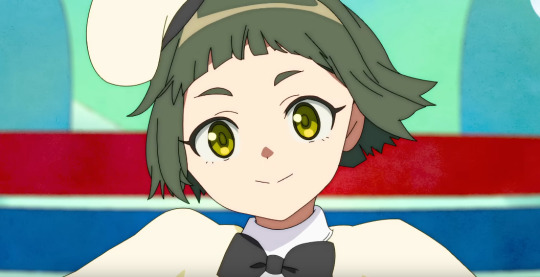

Propaganda for both options under the cut!

Propaganda for HALF:
kazui may just be an old gay man but HE CAN SING.
its. literally stunning.
like aside from his character and everything else, half is just really really beautifully written
THE INSTRUMENTALS.
HIS V O I C E??? its so pretty
heartbreaking lyrics. i dont love kazui as a character but i have bawled to half
GAY RIGHTS !!!!!!!!!!!!!!!
Love amane but she will undoubtedly win when her purge march poll rolls around, so lets let the old man have a win shall we?
---
half propaganda let's goooo sorry i'm sobern't in true kazui style so this probably won't make a bit of sense
theatre kid man. i love him, incredible mv.
this song is pure ASMR to me
visually aligned with Cat and it's so lovely to see that continuity
the GRAINY MOVIE DOTS THING ON THE MV <3
kazui is so dramatic. i love him i love him
dapper gentleman. such clothes
the key change is so well done
AND THE . THE PART WITH THE. THE ENDING SORT OF LYRICS OVERLAID WITH SPEAKING. and then his quieter singing and, and, and o h my god. im sorry. im not very coherent abt this rn
every part of the song is amazing but once it gets to the key change and after it keeps stepping up the amount of being perfect
kazui is in it
um
kazui is in it
go my psionic warriors vote for everyone's favourite failhusband
no children were tortured in the making of this MV (cough looking at You magic)
---
Allow me to present my Half propaganda!
- The slower tempo adds a very relaxing feeling to the song. Kinda ironic, but I like it! It sort of reminds of old indie songs from 2012 (especially with what I think is whistling added in the instrumental in-between chorus and verses.)
- Kazui’s voice. Enough said.
- It’s very easy to listen to, and I find it’s one of the only songs from Milgram that I like to listen to out of context (besides After Pain, Backdraft, and Purge March, oddly enough.)
- The MV is rife with imagery, and is used to beautiful effect. It really makes you feel for Kazui and his situation.
- The scene with him and Hinako before the key change… that makes me so emo.
- The overlapping part at the end… the lyrics combined with the dialogue in the background makes me really sad in a way I can’t explain.
Propaganda for MAGIC:
MAGIC MY BELOVED MAGIC!!! Its one of the best MVs in the entire series, even including T2. Magic is visually stunning and has some fantastic art direction but also is very clever in how it conveys its themes and ideas. Magic doesn't really hide anything from you, not really. It's all symbolic but it Tells You Things. It shows you the abuse, it shows you the cat. There's a fun little relationship going on here where, In Magic. Amane's pain and suffering isn't taken seriously by the people around her and the Audience we are discouraged to take it at face value due to the fictionalized nature of Magic. It's so cool. I'm so fond of the song as well, it's one of the best in the series purely cause of the Layers in it. The implications of this Inability to be good is seeped into Magic. Amane knows this isn't reality, Magic knows it's a show, she watches it at the end. And it's so Sad to me that even in her fictionalized happy world she Cannot be a good girl. It's a standard completely out of reach for her and that idea is just conveyed so well visually.
Im not even talking about the goddamn cat yet- the cat symbolism goes Deep. That cat is HER it has the same wounds Amane has in Purge March. I- I cant talk about the intertextuality of Purge March and Magic here this is Magic propaganda only- I- there's so much good stuff to Magic. I Re watched it over and over again. It has some the Best Writing and Visual Communication in Milgram and I will Die on this Hill.
---
shoutout to magic for having pretty props AND being vague as fuck about the crime! diversity win!
seriously though amane looks SO cute in it! the mv has such a pretty and colorful style and even with that it's able to show the horrors of what amane went through.
adding onto my last point. that scene where the cat is hyperventilating and you see the camera shaking???? that scene where the mascots find amane helping the cat and they're all standing over her? CHILLS. im repeating myself but the fact that they were able to portray the awful things amane went through in a genuinely emotional way while still keeping the cute cartoon look is soo impressive
there are SO many layers to itill the entire cartoony style making it look like a tv show… utilizing the cartoony effects and bright colors to show amane downplaying her own pain… the transformation after she gets punished barely changing anything to show just how manipulated she was from the start… ueueueue
ALSO ALSO ALSO THE SCENE AT THE END WITH AMANE STARING AT THE SCENE? OHHH ITS SO GOOD it adds such a feeling of dread and reminds you on top of this whole thing that all of this is truly horrifying! something is going on here!
this song is so catchy it gets stuck in my head CONSTANTLY
"Dear wise one, Am I worthy? Is it ok to spoil myself?" AMANE... UEUEUUEUE
the little ding sound effects in the instrumental?????
amanes voice is ADORABLE
THE INSTRUMENTAL IN THAT PART WHERE SHES HELPING THE CAT HAS THAT GODLY TYPE SOUND YOUD TYPICALLY ASSOCIATE WITH CHURCHES AND STUFF AND I DONT KNOW HOW TO EXPLAIN IT PROPERLY BUT JUST RELISTEN TO IT AND YOU WILL KNOW WHAT I MEAN. ITS SUCH A NEAT DETAIL
i could go on about this mv for days but i am not a theorist unfortunately. just. magic sweep
88 notes
·
View notes
Text
A hypothetical look at the childhoods of Carlo and Romeo
Despite Carlo and Romeo being two of the most central characters of Lies of P, what we know about their backstory is next to marginal. We know that the two of them went to school together and were best friends (perhaps even more than that), but their time in Monad Charity House is only presented in snippets and fragmented memories, and despite being highly significant, their characters remain elusive - like shadows cast over the entirety of the story, always present, never tangible.
Thus, many have filled the gaps left in their characterization with their own imagination. As for myself, I was curious what their early lives might have been like, before they met at Monad Charity House - and since it was the closest thing to the game's setting I could find, I did some research on Victorian children and their upbringing.
What I found out, however, left me absolutely shocked and made me keenly aware of just how awful Carlo and Romeo's childhood must have been, going by historic standards. As pretty much everything during the Victorian Era, a child's upbringing was very dependent on social class - however, no matter if you grew up in a rich or poor family, each came with its own kind of suffering, and regarding the question of "What were Carlo and Romeo's lives like before Monad Charity House?", the brief answer would be: "Probably not great."
As for the long answer... I should mention this is my own interpretation of Carlo and Romeo's backgrounds, and none of this is officially confirmed. However, given what we know about the two's origins, I consider it quite plausible, and what we can conclude from it might not only give us better insight into their personalities, but also some of the real-life background behind the original fairy tale of Pinocchio.
Just as a fair warning, though: This is about to get a little depressing.
[Spoilers for Lies of P!]
[CW: mentions of very questionable parenting methods, depression, suicidal ideation, poverty, parent death, child labor, abuse and exploitation of children]
Carlo
For this analysis, I'm going to assume that Carlo was born into a fairly well-off household. (The description of Carlo's portrait calls him "an aristocratic boy", and since Geppetto is the mastermind behind Krat's puppet technology, I assume he'd have his fair share of the profits.)
By the standard of their time, upper-class children were quite spoiled: Unlike their working-class peers, they never had to worry about who was going to provide food for them, and the horrors of child labor were never of any concern to them. You would think that being born into a rich family doesn't leave you a single thing to wish for - you'd have nice toys, fine clothes... and well, everything, except for parental affection.
For the most part of the day, upper-class children wouldn't even see their parents - they were only summoned to appear before them at a set hour of the day, and during these occasions, they had to address their fathers as "sir". Essentially, meeting your parents was more like an audience with a stranger, a rare privilege strictly regulated by formality. Children were expected to act prim and proper, only allowed to speak when spoken to, and thus unable to express their true feelings, thoughts, or opinions. Any show of affection was extremely rare - Winston Churchill (1874 - 1945) once remarked that he could "count the times he had been hugged by his mother" as a child.
The parents were more or less completely absent from their children's lives, and when there actually was interaction between them, the children were expected to unconditionally obey their parents. Osbert Sitwell (1892 - 1969) once commented: "Parents were aware that the child would be a nuisance and a whole bevy of servants, in addition to the complex guardianship of nursery and school rooms was necessary not so much to aid the infant as to screen him from his father or mother, except on some occasions as he could be used by them as adjuncts, toys or decorations." (Can you imagine? Geppetto taking Carlo to some big social event to show off his "perfect little son", and Carlo just standing there and silently enduring the ordeal, looking at his father all the while and wondering "Did he ever realize I'm not one of his puppets?")
So, by the standard of the time period Lies of P is set in, Geppetto neglecting his son isn't even anything terribly unusual - in fact, that's perfectly normal Victorian upper-class parent behavior.
Since they didn't take care of their children themselves, upper-class parents would hire a nanny to raise them. Nannies would be instructed what kind of behavior and morals the parents wanted instilled into their child, and they would be responsible for their education as well as teaching them manners, propriety, how to dress and so on. As such, the nanny effectively acted as a substitute for the parents - and given that maid puppets exist and Geppetto probably wouldn't let any strangers near Carlo, Carlo's nanny was most likely a puppet as well.
The daily life of upper-class children was based on strict routine - some like to say it operated with "clockwork regularity". Breakfast would be served at 8 o'clock in the morning, dinner at 12 o'clock, and tea at 6 o'clock.* Children would very seldom leave their room, except to take short walks in the park with their nanny. Education would mostly be given at home by a tutor, which included basic lessons like reading, writing, and arithmetic, but also "socially appropriate skills" like dancing and playing the piano. (Since we see a puppet giving piano lessons to a child in the intro, chances are Carlo's tutors were also puppets.)
*Eating times varied throughout the Victorian Era; a "dinner" might also be a meal eaten during midday.
The rest of the time, children would have nothing to do but to play with their toys (except on Sundays, which was forbidden). Rich families had the luxury of being able to afford the most elaborate of toys, such as automated dolls, clockwork trains, and jack-in-the-boxes, which were extremely popular among children. In fact, since clockmakers were also the ones to build toys, I could imagine Geppetto actually made the toys for Carlo himself. (However, I feel like this only would have made Carlo loathe them; in his eyes, it would've been proof that "father pays more attention to the toys he makes for me than actually looking at me".)
In short, the life of Victorian upper-class children was lonely, depressing, and stuffy to the point of suffocating. Given these circumstances, I would actually be surprised if this didn't leave mental scars on Carlo. It has been documented that a lack of parental affection causes psychological issues lasting all the way into adulthood, such as low self-esteem, trust issues, anxiety, difficulty with social relationships, and lack of emotional control. Also, considering Carlo was probably surrounded by puppet servants all day, he wouldn't even have had a single human being to interact with most of the time - something which most likely had a detrimental effect on his psyche.
Given this dreary existence, it would make absolute sense for Carlo to look nothing short of depressed in every depiction we see of him. The feeling of emptiness when being pressed into the corset of others' expectations is actually something I'm well acquainted with - it feels like walking beside yourself, like your body moving while actually feeling dead inside. A bit like a puppet on strings, if you will. With his life being a monotonous routine controlled by someone else, it wouldn't be surprising if Carlo had difficulty still seeing a purpose in it. (There have been some theories going around that Carlo committed suicide; at the very least, I think it's highly likely he had suicidal ideations during his youth.)
Perhaps this is where Pinocchio - the character from the fairy tale - might have become something like an identification figure for Carlo. Pinocchio was a puppet, but instead of doing what his creator intended - what his father expected - he did whatever he wanted. I'm sure Geppetto gave him the book as a measure to educate him, but it ended up having the opposite effect. In fact, it might have been what first taught him the concept of freedom: Geppetto's puppets only ever did what he told them to, executing the exact actions he had programmed them with, over and over again - but Pinocchio showed Carlo that it didn't have to be this way. (I've seen a lot of interpretations of Carlo disliking puppets, and while I can see where this is coming from, I don't think this is because Carlo disliked puppets in general. Rather, I think he saw them as "extended arms" of his father and a symbol of his need to control everything around him; otherwise, it would be a little strange for Carlo to be attached to the story of Pinocchio so much.)
However, I think beneath all the pent-up frustration and hatred, there was also the wish for his father to love and appreciate him. At the end of the book, Pinocchio returns to his father after all the hardships he had to go through, and the two reconcile and live happily ever after. Since Pinocchio's father goes looking for him when he disappears, perhaps Carlo believed that if he rebelled against him and put himself in danger, Geppetto would realize that he actually cared for him.
So, if Carlo was very prone to temper tantrums and acting defiantly towards his father, it might have been on one hand to show that he didn't want to be part of Geppetto's perfect stage play anymore, and on the other because he was vying for his attention. Due to his upbringing, however, Carlo wasn't really able to communicate his feelings in a proper way. (I like to imagine Carlo as a very emotional person, but having difficulty to actually express his feelings.)
Geppetto, however, wouldn't have the sensitivity to understand this - he most likely would've tried to rectify his son's "mischievous behavior" by disciplining, as was typical for the time period (in general, it was believed that you had to "beat the evil out of children" for them to become a good person). Of course, that wouldn't have made things better - in fact, I wonder if part of the reason Geppetto sent Carlo to Monad Charity House was that he was just at a loss what to do with the boy. Since all of his educational measures were fruitless, perhaps he thought that sending him to the boarding school would finally put Carlo on the right track - although the result of that probably was also quite different from what Geppetto expected.
Romeo
Meanwhile, poor Victorian children had to live in a completely different, brutal reality - for them, day-to-day life was a literal struggle to stay alive.
We know that Romeo was an orphan, and according to Eugénie, that's not much of a rarity in Krat. Indeed, street children existed in abundance during Victorian times: It wasn't uncommon for working-class children to lose one or both parents - due to unsanitary conditions in Victorian slums, many people died of disease, and given the hazardous working conditions in factories and coal mines, accidents were commonplace. However, the term of a Victorian orphan was actually a little broader than that, also extending to children who ran away from home due to hailing from alcoholic and neglectful families. Often, mothers who were single or had a child out of wedlock would also simply abandon their children. Whatever the reason for their situation, these children were forced to fend for themselves at a very young age.
In the Trinity Sanctum in Krat Central Station, there's a note mentioning a "pickpocket who was overconfident in a gamble" and "had his heart stolen and died". Since Romeo made "a deal with the devil" (the "devil" presumably being Geppetto who turned him into a puppet), people have interpreted this as referring to Romeo. Turing to crime to support themselves was not a rarity among poor Victorian children - in fact, half of the defendants tried at the Central Criminal Court of England and Wales between 1830 and 1860 were aged 20 or younger. There were even organized gangs of child thieves who were trained in pickpocketing by a "captain", similar to those from Charles Dickens' novel Oliver Twist. (However, the items that were stolen most often were actually not purses or pocket watches, but handkerchiefs; silk handkerchiefs had a pretty high resale value, and the thieves would take them from pockets, rip out the initials, and resell them for a good price.)
We can't be sure whether Romeo teamed up with a few other kids or not, but personally, I'd wager he did - it would be much safer to operate in a group in case one of them gets in trouble, and overall, Romeo's personality seems a bit too caring for a lone wolf. (As the King of Puppets, he was not only determined to save as many humans as possible, but also possessed the unconditional trust and loyalty of the other puppets. To me, this means he most likely cared about them, and they cared about him in return - if it was just programming, the puppets probably wouldn't be lamenting his loss after he dies. Compare this to Geppetto, who has to use force and coercion for others to obey him.)
Also, since the notes in the Trinity Sanctums always seem to have a connection to the place where they're located (factory worker -> factory; cleric -> cathedral; "greatest singer"/Adelina -> opera house), that would mean the train station was most likely Romeo's base of operations.* (Train stations tend to be very popular among thieves, since it's easier to pick pockets in the confusion of people boarding or getting off trains.) This would imply that Romeo didn't grow up in Monad Charity House since he was an infant, but arrived there at a later point during his childhood.
*EDIT: I just had a thought that the note in the Trinity Sanctum could also mean the train station is the place where Romeo died. (All the other notes are connected to murder or some other violent action, and since we can assume they were written by Arlecchino, he was probably more interested in that.) Since Geppetto has his secret workshop wagon in Krat Central Station, maybe the place where he built P is the same where he built Romeo.
Since there were so many orphaned children, the few orphanages that existed couldn't receive all of them. Instead, workhouses were established as institutions for all kinds of destitute people - including orphans - who were unable to support themselves and were given lodging and food in exchange for labor. However, many children actually preferred living on the streets, rather turning to crime than going to the workhouse. At a first glance, this may seem a bit unreasonable - surely, not having to run around in worn-down rags and steal your food just to survive would at least be an improvement?
Well... Turns out, not really. The conditions in Victorian workhouses were notoriously awful - they were overcrowded, unsanitary, and cruel places to live. Daily routine was strictly regimented, consisting of 9–10 hours of repetitive and physically demanding labor and very little free time. What little food there was was of poor quality, privacy was basically nonexistent, and the dozens of inmates sleeping together in dormitories often had to share their beds - children usually had to sleep up to four in a bed. The consequences for refusal of work or any kind of rule violation were beatings, deprivation of food, being locked up in solitary confinement in a dark cell, and other draconian punishments.
If this doesn't sound like a very hospitable atmosphere, that's because that was the exact intention behind it. Workhouses weren't meant to support poor people - they were supposed to scare them into finding work and make a living for themselves. Victorians viewed poverty as a self-imposed misery, and if you were a pauper, that was because you were lazy, retarded, or made bad choices in life. That's why beggars, vagrants, orphans, criminals, and mentally ill people were all indiscriminately housed in workhouses, because from the Victorian point of view, they all belonged to the same category of people: A stain that had to be removed from the public eye, either by forcing them to support themselves or by making use of their work force once they had donned the workhouse uniform. They were a nuisance to society, and their treatment in the workhouse was sure to make them feel that.
One of the worst fates for workhouse children, however, was to be hired out as pauper apprentices: Usually from 10-13 years of age, but sometimes as young as eight or seven, workhouses would send pauper children to factories in the countryside for an "apprenticeship". This "apprenticeship" involved factory owners buying children from orphanages and workhouses and making them sign a contract that lasted until they were 21 years of age, dictating that the apprentices had to be provided with food and accommodation, and in exchange, the factory owner was free to make use of their working power.
So in summary, workhouse orphans were essentially sold into slavery. This was all that much easier to do with children who had no parents and no other means to support themselves, and thus were free to be exploited by their employers. Some of the recollections from these former pauper apprentices are just utterly horrific - and in this case, I think it's appropriate to let the victims speak for themselves.
John Birley, who lost his father when he was two, lived in the Bethnal Green Workhouse for a time after his mother died of illness when he was around six. He was sent to Litton Mill as a pauper apprentice, and he had this to say about his experiences in an interview with The Ashton Chronicle in 1849 (source):
The same year my mother died, I being between six and seven years of age, there came a man looking for a number of parish apprentices. We were all ordered to come into the board room, about forty of us. There were, I dare say, about twenty gentlemen seated at a table, with pens and paper before them. Our names were called out one by one. We were all standing before them in a row. My name was called and I stepped out in the middle of the room. They said, "Well John, you are a fine lad, would you like to go into the country?" I said "Yes sir".
We had often talked over amongst ourselves how we should like to be taken into the country, Mr. Nicholls the old master, used to tell us what fine sport we should have amongst the hills, what time we should have for play and pleasure. He said we should have plenty of roast beef and get plenty of money, and come back gentlemen to see our friends.
The committee picked out about twenty of us, all boys. In a day or two after this, two coaches came up to the workhouse door. We were got ready. They gave us a shilling piece to take our attention, and we set off. I can remember a crowd of women standing by the coaches, at the workhouse door, crying "shame on them, to send poor little children away from home in that fashion." Some of them were weeping. I heard one say, "I would run away if I was them." They drove us to the Paddington Canal, where there was a boat provided to take us.
We got to Buxton at four o'clock on Saturday afternoon. A covered cart was waiting for us there. We all got in, and drove off to the apprentice house at Litton Mill, about six miles from Buxton. The cart stopped, and we marched up to the house, where we saw the master, who came to examine us and gave orders where we were put. [...]
Our regular time was from five in the morning till nine or ten at night; and on Saturday, till eleven, and often twelve o'clock at night, and then we were sent to clean the machinery on the Sunday. No time was allowed for breakfast and no sitting for dinner and no time for tea. We went to the mill at five o'clock and worked till about eight or nine when they brought us our breakfast, [...]
We then worked till nine or ten at night when the water-wheel stopped. We stopped working, and went to the apprentice house, about three hundred yards from the mill. It was a large stone house, surrounded by a wall, two to three yards high, with one door, which was kept locked. It was capable of lodging about one hundred and fifty apprentices. Supper was the same as breakfast - onion porridge and dry oatcake. We all ate in the same room and all went up a common staircase to our bed-chamber; all the boys slept in one chamber, all the girls in another. We slept three in one bed. [...]
Mr. Needham, the master, had five sons: Frank, Charles, Samuel, Robert and John. The sons and a man named Swann, the overlooker, used to go up and down the mill with hazzle sticks. Frank once beat me till he frightened himself. He thought he had killed me. He had struck me on the temples and knocked me dateless. He once knocked me down and threatened me with a stick. To save my head I raised my arm, which he then hit with all his might. My elbow was broken. I bear the marks, and suffer pain from it to this day, and always shall as long as I live.
I was determined to let the gentleman of the Bethnal Green parish know the treatment we had, and I wrote a letter with John Oats and put it into the Tydeswell Post Office. It was broken open and given to old Needham. He beat us with a knob-stick till we could scarcely crawl. Sometime after this three gentlemen came down from London. But before we were examined we were washed and cleaned up and ordered to tell them we liked working at the mill and were well treated. Needham and his sons were in the room at the time. They asked us questions about our treatment, which we answered as we had been told, not daring to do any other, knowing what would happen if we told them the truth."
In case there were any surviving family members, the children were sometimes deported without their knowledge. In 1849, Sarah Carpenter related the story of her lost brother who was taken away from Bristol Workhouse to The Ashton Chronicle (source):
When I was eight years old my father died and our family had to go to the Bristol Workhouse. My brother was sent from Bristol workhouse in the same way as many other children were - cart-loads at a time. My mother did not know where he was for two years. He was taken off in the dead of night without her knowledge, and the parish officers would never tell her where he was.
It was the mother of Joseph Russell who first found out where the children were, and told my mother. We set off together, my mother and I, we walked the whole way from Bristol to Cressbrook Mill in Derbyshire. We were many days on the road.
Mrs. Newton fondled over my mother when we arrived. [...] My brother told me that Mrs. Newton's fondling was all a blind; but I was so young and foolish, and so glad to see him again; that I did not heed what he said, and could not be persuaded to leave him. They would not let me stay unless I would take the shilling binding money. I took the shilling and I was very proud of it.
They took me into the counting house and showed me a piece of paper with a red sealed horse on which they told me to touch, and then to make a cross, which I did. This meant I had to stay at Cressbrook Mill till I was twenty one.
So, if the situation in the Lies of P universe in any way resembles that during the real-life 19th century, and if these street children are in any way smart, I think it's very understandable they'd want to stay the hell away from the workhouse or any similar institution. Of course, it would be easy to attribute this to laziness, but honestly, I'd say they just wanted to avoid the abuse. (You could pose the question whether there are even any lowly paid jobs for children to do in the LoP universe, since a lot of those were probably taken over by puppets. However, if you ask me, that might only lead to employers trying to underbid the price that puppet laborers would cost, which would lead to serious wage cuts for any human workers - we know there was a violent protest of the factory labor union, which might have happened for a reason like this. Also, I reckon the puppet industry itself would create new branches of "dirty work", like recycling parts from scrapped puppets, disposing of puppet junk, etc.)
In fact, these harrowing stories happen to have quite a few parallels to the original fairy tale of Pinocchio. Did you notice? The children are taken away in coaches and carts, in a way that conceals their presence (e.g. in a covered cart or in the dead of the night), which is very reminiscent of the Coachman picking up boys at night (in the book, the coach is described as having wrapped wheels, so it doesn't make noise and can't be discovered). At first, the children are told they can make a fortune by working in the textile mills and will have plenty of time for leisure - in A memoir of Robert Blincoe from 1828, it's even mentioned they tried to lure children into working in a cotton mill by telling them that "they would be transformed into ladies and gentlemen" when they arrived there, that "they would be fed on roast beef and plum pudding, be allowed to ride their masters' horses, and have silver watches, and plenty of cash in their pockets". This sounds quite similar to the Coachman promising the boys unlimited play time and freedom if they come with him to the Land of Toys. However, as both the pauper apprentice children and the boys from Pinocchio had to realize, all of this was a fraud to exploit them for what is essentially slave labor.
This also suggests that with his depiction of the Land of Toys, Carlo Collodi was doing more than just telling a horror story to scare kids into behaving. He was commenting on a real-life problem - and this, exactly this, is what Collodi wanted to warn his young readers about. In that sense, the boys turning into donkeys might also be a metaphor for what their employers saw them as: livestock, to be used and abused as they pleased.
Because the living conditions of workhouse children were so appalling, there was clamor for change, specifically among the reformist middle class. It was argued that orphans and destitute children should be housed in an institution meant exclusively for them, rather than together with criminals, cripples, and lunatics. The movement really began to pick up speed in mid-19th century, and many orphanages were founded by private benefactors and philanthropists. One of the most influential was Thomas John Barnardo, the founder of the charity Barnardos, who built homes for waifs, strays, and all kinds of children in need to provide them with a place to live, food, and education.
In general, there was an effort to make education accessible to even the lowest classes. Sunday Schools and Ragged Schools were established, which allowed poor children to take classes without having to pay a fee, giving them more opportunities in later life. However, the parents of working-class children were often against them going to school, since it meant that they couldn't work to earn additional income for the family. This is why attending school was made mandatory for all children between 5 and 10 in 1870, with the leaving age being raised to 11 in 1893. (This is also what Carlo Collodi meant by saying "for the love of God, get yourself some education" - because if you didn't, you would be stuck in a circle of bone-breaking labor forever.)
The Monad Charity House fits quite well into this historical frame: We do know that the Rose Estate was originally a charity organization for poor children, but was turned into a boarding school after Lady Isabelle and the Monad family started sponsoring money. Since charities for poor children are a phenomenon of the mid- to late-19th century, it's possible the situation was a lot worse before in the Lies of P universe as well. Romeo might not have gone there willingly (perhaps he was caught during one of his thefts), and truth be told, Victorian schools weren't the most rosy of affairs (if you'd like to know the details, feel free to check out this page). However, given what could've been his fate, Romeo probably considered himself lucky to be alive and not exploited by someone else for donkey work. (Still, one thing that should be kept in mind is that the Alchemists' patronage of the Rose Estate probably isn't based on purely altruistic motives: Since all of the children are trained as Stalkers, Alchemists, or Workshop Technicians, all of them ultimately become part of Krat's economic apparatus.)
It seems almost miraculous that two boys coming from such different worlds would develop such a strong bond. However, despite this, they had one experience in common: pain. Although the way in which they suffered might have differed, they both knew what it's like to be abandoned. Romeo had to grow up in a society that didn't care whether he lived or died, and since all Carlo ever received from his father was scrutiny or cold ignorance, he probably felt the same about him. Living in a cruel world where the odds were stacked against them, it's easy to see why these kindred souls sought comfort in each other.
In any case, if the untold backstory of these characters was crafted with this in mind, my sincerest compliments go to the people of Neowiz for not only taking such a nuanced approach to child education in a historical context, but also for doing so with respect to the original story by Carlo Collodi. It may be really subtle at times, but you can't deny how much effort the devs put into the themes - themes that are so universal to human psychology that they continue to be relevant today, and undoubtedly made the story resonate with a lot of people.
#lies of p#lies of p carlo#lies of p romeo#lies of p geppetto#analysis#lore theories#the adventures of pinocchio#carlo collodi#I've never used so many content warnings in a post before xD#Carlo seriously has one of the most messed up family situations I've ever seen#like I knew it was bad; but I had no idea it was THAT BAD#also I was floored when I found out that the Coachman essentially had a real-life inspiration#anyway here I am back to trying to deduce story contents based on historical comparisons xD
32 notes
·
View notes
Text
Part of me kinda wants to stop DMing my first and current campaign? IDK just need to vent
So, brief expo.
like many, got into CR during the pandemic (mainly due to "The Legend of Vox Machina" which lead to me actually bingeing the all 3 campaigns)
During which time a friend (who was in my immediate friend group but like the rest of my friend group, i didnt really feel close to) told me that he was really into CR as well.
As a fresh new critter, i was stoked. Was able to share my blossoming love of CR with someone (FINALLY!) during which we both mentioned how D&D looked so much fun and that it would be really great to be able to play and ooo what if we got our friends together and played.
After which we discussed, if we did, who would be DM? Seeing as how none of our friends really played D&D our talk lead to either my friend or me and after asking the question "Which do you think you would prefer more?" It was clear i would try my hand at DMing (i like lore in games, and i like storytelling, and im a tad bit of a control freak at times, lol)
Anyway, we eventually got in touch with our close knit of friends, and though i intended to be a standard 6 we suddenly had an 8 party party (and that was with me having to tell even less close friends there wasnt room).
Feeling it would still be manageable (as there was precedent that i could pull inspo from, CR) i began planning a rough idea of a campaign and working with my friends to create their characters and running a session 0 so we were all on the same page. You know standard stuff.
-Fast Forward to current date and time-
It has its stressful moments, but i still am able to enjoy the time with my friends for the most part (though theres a lot of times were ive never felt lonelier)
Which brings me to the whole point of the post, my need to vent to the void about this loneliness.
Nobody really gets in touch or interacts with me at all. Not to talk about the campaign or even collab on their characters. The most i get are occasional critiques about how i could have done something better couple sessions prior and request to add another person to the 8 person party. When we have sessions, people show up late quite often, leave early quite often, have to cancel as they have other things they are doing (even though we planned and scheduled weeks prior) and even when people are there they somtimes feel like they arent always present.
i already feel extremely distant from all of them as they all live closer to each other while i live on the totally opposite side of the state and theyve known each other way longer than i have, but the minimal interactions they have with me, the DM/GM of all people, just continues to add to all of it
I know we all are busy with our lives, and that compared to those things D&D is really not that big of a deal or important. And i get that, it is just a game afterall, but it still manages to hit pretty hard
I've communicated my feelings through our time of this campaign, if im being honest, maybe not this indepth. I mean, its partially because i barely see or talk to them (again life gets in the way) but also because i feel extremely guilty for putting this kind of tension to something we are all supposed to be enjoying and relaxing to.
Its especially painful as most recently 2 players, who said they would get in touch with me about changes possibly being being made to their characters, never got in touch in anyway shape or form, and its been about a month now? And session is in a week...i didnt even get much as a reply back.
Idk, its been almost about a year now and i felt i just needed to get this out somewhere other than debating myself.
Thanks for listening tumblr.
#D&D#Dungeons and Dragons#venting#vent post#its just a game it really isnt a big deal#feels pretty lonely though#not what i was hoping for
26 notes
·
View notes
Text
THE GUARDIANS OF THE GALAXY AND THEIR LOVE LANGUAGES.
Forgive me for any mistakes of lore, names or character traits etc.. I am bad at remembering things.
Not proof read.
ALSO NOTE THAT THIS DOESN'T MEAN "THESE ARE THE ONLY LANGUAGES THAT WORK ON THEM" IT MEANS "THESE ARE THE ONES THAT WORK BEST OUT OF ALL OF THEM"
And theres things like least favorite, too.
--------------------------------------------------------
ROCKET RACCOON

RECEIVING -
(What is most effective towards him)
GIFT GIVING.
(Particularly prosthetic limbs)
QUALITY TIME.
Think like co-playing. Both in the same room doing different things. Sometimes talking
WORDS OF AFFIRMATION.
This one is probably pretty intense for him, so he only lets it actually sink in if it's a short sentiment from someone he truly cares about. Like, a friend being like "wow you're so cool!" Would definitely make him feel good, and probably inflate his ego/self esteem, but wouldn't really set in. But if like, Peter or Mantis etc. said something like "I appreciate everything you do for this team, we love you" that might actually hit hard. That's what I mean when I put words of affirmation here
---
GIVING
(What he would give you or others)
WORDS OF AFFIRMATION.
QUALITY TIME.
These two are his most standard forms of affection. He also gives them like he receives them. So, if someone he's friends with is a silent type, comfortable silence in the same room. If they're talkative, some light chatting is ok, and so on. Words of affirmation from him would most likely just be surface level stuff like "Good job" "You're not as dumb as I thought" "that's a neat trick" etc. sort of a friendly bullying. How people respond to that bullying tells him a lot about someone, usually. Just like with himself, if he's particularly close to someone, he may let out the occasional genuine praise without a layer of sarcasm.
LEAST FAVORITE
Physical touch.
Yeah, ouch, I know.
Not only is he smaller than everyone, which might make physical touch overwhelming, but he also has the situation on his back. But deep down, I think he's a bit touch starved (Everyone in the dang MCU is at this point) and secretly enjoys it. You just can't be heavy handed, and he really has to trust you. And too much too frequently may make him feel like a pet. So be careful.

(theres no way he would admit though, If asked about it he would simply say "Cause I don't want you gross sweaty skin bags all over me", referring to most peoples lack of fur)
-------------
PETER QUILL
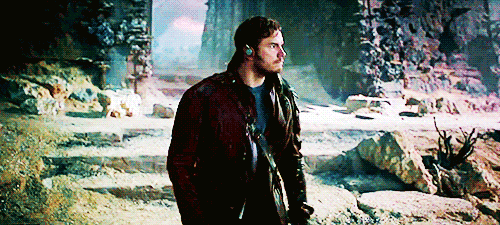
(Theres like only 4 gifs of him. Why does my boy not deserve tasty gifs)
RECEIVING
-----------
With Peter it heavily depends on where you are in his timeline. The "golden age" Peter, where Gamora is alive and in love, and its good times for everyone, is probably not focused on relationships outside of the team (which might be part of his issues that were addressed in Vol 3.) The "everyone I love is dead" peter is in an extreme depressive state and obviously isn't going to be making new friends or even be responsive to his current friends (for the most part). The post Vol3 "Reconciled with my dad and stopped hopping on lily pads" Peter is new man! But also the same, being like a rebuilt version of himself. He would now, in my opinion, value every relationship he has. Every opportunity he has to be with other people becomes valuable, and everything he does is to honor the people who loved him when no one else did (Mama Quill, Yondu, Gamora etc.) and serve the people who love him now and kept loving him even through hard times. (Rocket, Mantis, Drax, Groot etc.).
With that said,
ACTS OF SERVICE
GIFT GIVING
I see Peter feeling loved more through actions and physical items because of what he's been through, making him crave things that are solid and real. Also Yondu was a lil trinket collector so that may turn up in Peter too. But, I also think Peter may feel a little guilty when receiving gifts. Very grateful, though.
I will also add
WORDS OF AFFIRMATION
QUALITY TIME
Because even despite what I just said, I think a solid "You're so strong, I look up to you" every now then would make him giggle and kick his feet a little internally.
And listening to music together or sharing music is also particularly special
At the end of the day, he's just happy to be around loved ones.
GIVING
Just as you may be doing right now, he would probably try and figure out what the specific person likes. So his giving just depends on the person.
LEAST FAVORITE.
He doesn't really have one. He just wants to be loved.
--------
DRAX
(The destroyer (and protector))
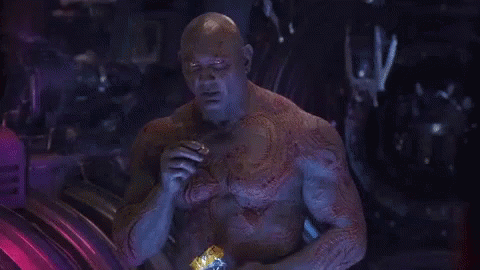
Drax is probably receptive to most forms of affection, but it has to be obvious and clearcut.
Like, doing subtle things in the background might not get his attention, but hugging him directly and saying something like "I appreciate you as a person and for everything you do for the team" would be a lot better, and mean a lot more to him, even though its a very bold/blunt move. Theres probably a balance between blunt and subtle, but it would be pretty easy to strike. You also don't want to leave room for interpretation if you're afraid of him misinterpreting the difference between platonic and romantic affection. Its a slippery slope, but as long as you avoid using the word 'love' without platonic clarification too many times, you'll be good.
Also Drax does does not make friends in the traditional sense, he simply decides who is and who is not his friend. Whether they know about it or not. Not even in a way thats like cold and calculated or something, he just thinks it in his own head and decides it, expecting the others to simply Know.
With that said,
RECEIVING
PHYSICAL TOUCH.
I say this is probably both receiving and giving, but he's probably less likely to give and more open to receive. I feel like he would just kinda stand there the first few times someone hugged him, but if it became a routine thing, he would become more reciprocal. That might sound like he doesn't like physical touch, but I think its rather the fact that along with his other social skills, physical affection just turns out.. different.. for him. Like when he pet Rocket. I think he's a physical person, it just comes out weird. I want to hug him. If you touch his muscles too much he may get weirded out, or think you like him.
GIVING GIFTS
If you give him something he likes, like zarg-nuts, oh boy. He will DEFINITELY like you. Thats all to be said.
GIVING
WORDS OF AFFIRMATION.
Things like "You're ugly, but thats good because then you know who really loves you", y'know.
GIFT GIVING
Will offer you zarg-nuts. Thats a big deal.
LEAST FAVORITE
Probably Quality Time, but only if its boring. I think he actually sees things like fighting alongside the team as quality time, so it might just be different than how we would interpret quality time.
Again, he probably is just generally receptive to each language so you can't really go wrong, as long as you come across right.
-------------------
GAMORA (pre and post)

(There's also not a lot of gifs of her at all)
So, much like quill, she has three versions. During Thanos, Golden Age, and Multiverse. I'll do Golden Age and Multiverse because I don't think During Thanos is interesting, at least not for this specific post.
Also golden age and multiverse are technically two different people.
GOLDEN AGE GAMORA
Golden age Gamora is, in my opinion, a very deeply feeling woman. She can be stone cold when she needs to, but I feel like she is very emotionally intelligent especially as she gets closer with the team. She is also very loving, and is often 'the rock' of a friendship. Or just generally the level headed, down to earth one.
-----------------------
RECEIVING
QUALITY TIME
Definitely finds spending time together and talking valuable. Even listening to music together is special.
WORDS OF AFFIRMATION
As long as the words are honest and not trying to just flatter her or try and get in good with her, she appreciates it. Honest praise goes a long way. Too much too often may make her embarrassed.
GIVING
Since she *is* rather emotionally intelligent, I imagine she would figure out what that person is most receptive to, and display that. But if it's someone she likes, like Peter, she may get bashful and have a hard time acting natural with it and would probably revert to her own preferred language.
LEAST FAVORITE
GIFT GIVING.
I imagine her upbringing caused her to not be a materialistic person. That said, gifts can be extremely special to her, but its just rare. So giving her flowers doesn't do anything but like if Peter gave her a mixtape, thats different.
////
MULTIVERSE GAMORA
A more hot headed, less sensitive version of golden age. Meaning she's probably more standoffish and less emotionally intelligent, but not by a lot, just sort of by the trimmings and details of her personality. Being with the ravagers probably does that to most anyone. Golden age has more motherly vibes, while multiverse has more protective older sister vibes.
--------
RECEIVING
PHYSICAL TOUCH.
In the form of rough housing and play fighting with her ravager friends. Not exactly in a tender way, although I do see sort of the "let me patch you up" angst. One of the differences between the two is that multiverse is more afraid to be vulnerable.
GIFT GIVING
Surprisingly. I think the ravager life style may make her a little more appreciative of having her own things. I imagine theres a lot of competitiveness for special food and special items, even if its playful. Even though something unnecessary like flowers may not excite her, things like a newer, stronger weapon could mean a lot. Golden Age may not feel the exact same only because it's probably more accessible. But lets say if its something Rocket made her, then it would be inherently valuable because its from her friend. With multiverse, things gain inherent value when they're useful.
LEAST FAVORITE
WORDS OF AFFIRMATION.
She doesn't need you to tell her she's doing a good job, she already knows. Compliments are only effective from people she respects above peer-level, which is rare. Joking around with her friends (loving insults, etc) is different though.
---------------------
GROOT (multiple ages)
(I couldn't find gifs of young adult groot, only many of baby groot and a few of groot senior. Sad)
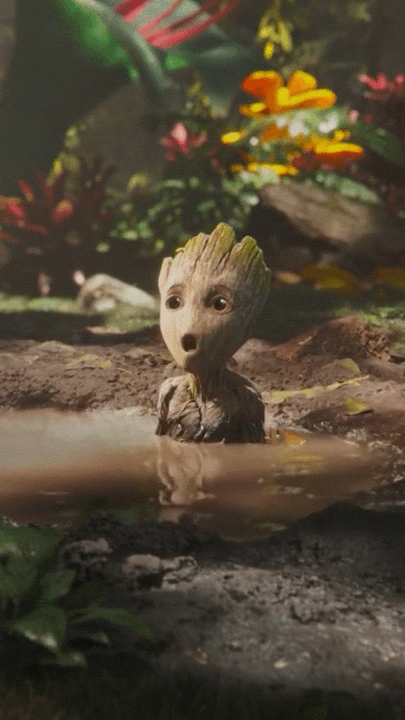
Baby Groot, Teen Groot, Young Adult Groot, Adult Groot, Groot Senior. So many choices. I'll do them ALL. (Except adult groot cause we just saw him for a few minutes so like- yknow)
GROOT SENIOR
Since Groot sr. was treated "more as animal" than a person, I imagine he doesn't have a concept of love language at all. Therefor, I will say that anything he perceives as loving, caring and protective action is his love language both giving and receiving. R.I.P. legend you will not be forgotten 🪽🕊️🕊️ 🙏 💯
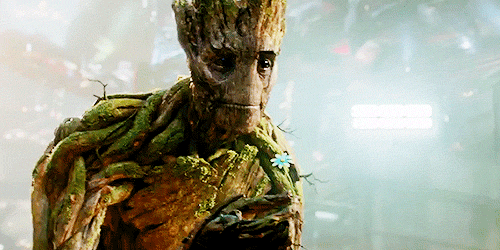
The original baby boy. I'm still sad.
-----
BABY GROOT
He's a baby, so in theme for babies, attention, physical affection, and quality time are pretty much his main priorities. He ain't got much going on. Older baby groot, like toddler groot, is more active and perceptive, so I'd say his main receiving language is words of affirmation, and his main giving language is acts of service.
TEEN GROOT
Teen groot is broody and angsty, and he's definitely not thinking about other's feelings. So I'm gonna say while it's rare, when he does show affection, it's act of service. Receiving is pretty much anything, he doesn't really care right now.
At least not about the specifics.
-
YOUNG ADULT GROOT
Now, groot is much more loving and affectionate. He is receptive to all love languages, and gives them all too. Except, theres not much use in words of affirmation for him unless he really loves the person.

-----
MANTIS
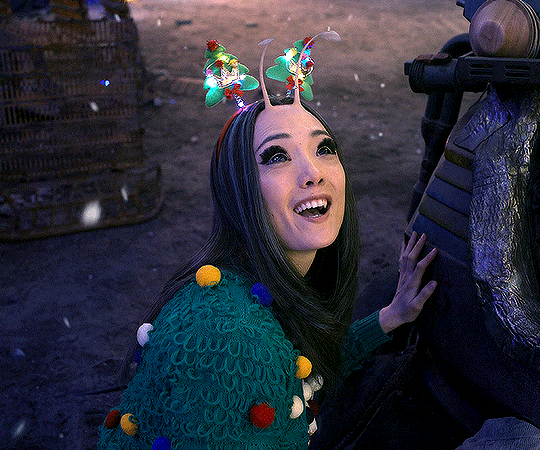
RECEIVING
Anything. As long as she can clearly tell it's love/affection, it's effective. Like Peter, she just wants to be loved.
GIVING
WORDS OF AFFIRMATION.
Being able to verbally explain how she feels to someone, and how she may appreciate that person, is the most confident option for her. She thinks that it's pretty effective, and is the safest option. She probably also never got a lot of affection at all before the Guardians, but I think she appreciates mental and social affection more than physical.
LEAST FAVORITE
Doesn't have one.
------------
NEBULA
(Last one I'm doing this post then I'll do a few more in a second post)
RECEIVING
QUALITY TIME.
Like board games and stuff, or at least thats what I think she wants, deep down. I feel like maybe she doesn't realize this is one of her love languages. Like it's subconscious.
GIFT GIVING.
With her upbringing, she only had things taken away. Giving her something of importance may mean a lot to her. Like her new arm in Vol3. Again since shes still a little emotionally constipated, she may not really realize this.
GIVING.
She doesn't really understand how to sort of actively pursue a friendship or how to read someones love language, so her giving language is probably just existing in the same space as someone without criticizing them. Because she doesn't quite know how to do more than that, or at least isn't comfortable right now. But she wants to and deep down she's trying.
------------
THANK YOU FOR READING!!!!!

I'll do like Adam Warlock and stuff next.
#marvel#the guardians of the galaxy#TGOTG#Peter Quill#rocket raccoon#drax#drax the destroyer#mantis#gamora#groot#young adult groot#groot senior#nebula#tgotg x reader#x reader#funny#sweet#short#love language#character list
86 notes
·
View notes
Text
Jack Jeanne Explainers: Takarazuka Revue

This post is a quick and probably incomplete overview of Takarazuka Revue specifically for the context of its inspiration on Jack Jeanne, for reference. It's a basic overview but it's not intended as a guide to the form and fandom.
Takarazuka Revue (JP: 宝塚歌劇団) is likely the most direct influence on the game. It also has a very dedicated fan base that maintains robust English Language resources, so if this aspect of things intrigues you, it is quite accessible to dive further into.
Takarazuka Revue is an all-female musical theater company founded in 1913 and based out of the city of Takarazuka. All roles, male and female, are played by women. It also has an associated training school, the Takarazuka Music School.
The original pitch for the game was an All Boys Revue School, so the reference starts at the very beginning, as a kind of gender swap of Takarazuka.
You may notice that the term used here for "Revue" 『歌劇』 is the same one that the game uses. It gets translated sometimes as "opera" sometimes as "theater" - in general the term does mean "opera" but it's pretty clearly not opera that they're training - it's being used as "Revue" the same way that Takarazuka uses it. Which is, loosely speaking, musical theater.
Continued below the cut --
(I suspect that the similarities in first sound and also first character between 宝塚 - Takarazuka and 玉阪 - Tamasaka are intentional as well)
Takarazuka was founded by a businessman looking for an attraction to draw people to the city and settled on the idea of an All Female Musical Revue and a focus on more western style musical, mostly, as far as I know, as a business decision and a feeling that traditional styles of Kabuki were falling out of favor with most people. It drew heavily from French Musical Revue. The full history of the company, like I said, is well documented in English, and is longer than I can get into, here.
Compare and contrast this to the information we get about the 13th Himehiko, the current principal's great-grandfather, Chuza Dairi. He's said to have been born during the Meiji era and lived into the Showa era, and was fascinated by western style musicals. He's credited with the name Univeil, and starting to use the Jack and Jeanne terms.
Takarazuka stands in contrast to a long line of male exclusive theater forms in Japan. Japan, of course, also puts on co-ed musicals, both originals and adaptations, like the rest of the world, but Takarazuka is very much, to use the phrase the game uses, the "pinnacle of all-female revues."
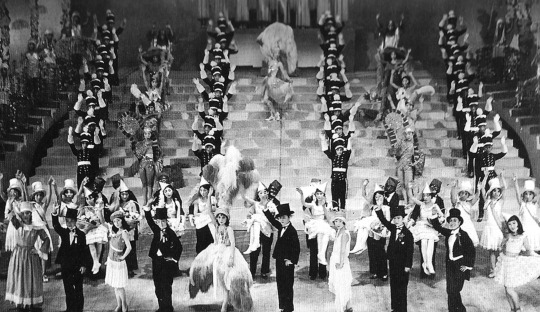
This image is of a showcase from 1930, where you can see the lavish, european revue style inspiration clearly.
In Takarazuka, male roles are called otokoyaku (男役) - which just means 'men's roles' and is the term Jack Jeanne uses for what "Jack" roles are. Female roles are called musumeyaku (娘役) - which translates to 'girl/maiden/daughter roles'. The game actually uses onnayaku (女役) or women's roles when introducing Jeannes.
(Worth noting that the character Kisa plays in the Newcomers' Performance is translated as Maiden but is 娘 (musume) in Japanese which means occasionally when she or other characters are talking about "playing the role of the maiden" they are saying "musumeyaku" which I think is probably an intentional reference.)
Takarazuka puts on Musicals as well as both song and dance revues. It adapts many things, from extant musicals to manga to film, as well as history and classic stories. It has a reputation for being bright, sparkly, and lavish in costuming and set design and dramatic in style.
The voice actor for Tancho, the singing teacher and head of Rhodonite, is a former Takarazuka Otokoyaku. Tancho's outfits and style of speech are directly taken from Takarazuka. The feathers Tancho wears are part of the standard Revue portion of Takarazuka shows.
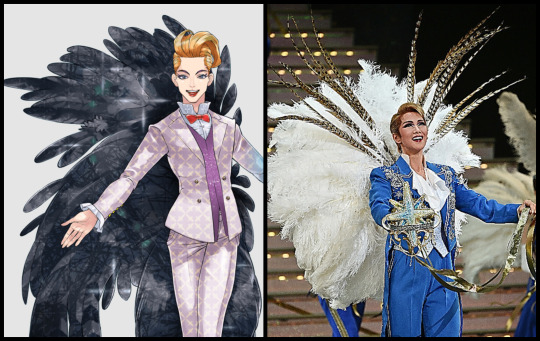
Right - Tancho's image, from the website, Left - Tancho's voice actor, Nanami Hiroki, from the Asashi article announcing her retirement from Takarazuka, showing her wearing one of the typical feather backed outfits that leads appear in parades after performances.
Otokoyaku are the stars of Takarazuka and tend to draw the biggest crowd and they get top billing, though each troupe tends to have a top Otokoyaku and top Musumeyaku, decided by a complex mix of seniority (especially for otokoyaku) and gradings. I will stop short of saying these are kind of like Jack Ace and Al Jeannes of a class, though. The Musumeyaku is expected to support her Otokoyaku. Using the terms Jack Jeanne uses, for Takarazuka, the Otokoyaku is essentially always the Flower, the Musumeyaku the Vessel, which is more standardized than the point of view of characters at Univeil.
The top Otokoyaku and top Musumeyaku are called the Top Combi (コンビ). Takarazuka and its fandom use that, rather than Partner (パートナー) that Jack Jeanne is fond of, which carries a potentially romantic connotation.
Takarazuka expects its actresses to maintain a more masculine or very feminine (depending on their role) persona on and off stage, and the expectations for behavior and appearance are quite strict even off stage. For example, much like Idols, they are expected to not date, let alone marry and have kids, until they retire.
EDIT: Someone who knows more than me let me know that the rules for dating are slightly more lax now, and relationships are tolerated so long as they are kept strictly out of the public eye - though still no marriage.
Jack Jeanne remains frustratingly vague on the rules for this during school -- No one seems to think dating itself is an issue, but Ao does say that it would 'cause trouble' if people saw them holding hands. So perhaps we're supposed to imagine something similar? But back to the post.
Takarazuka is divided into several different Troupes (組, kumi, read as gumi when used after the name of a troupe). They currently have five.
They break down as follows
Flower Troupe (Hanagumi 花組) - 1921
Moon Troupe (Tsukigumi 月組) - 1921
Snow Troupe (Yukigumi 雪組) - 1924
Star Troupe (Hoshigumi 星組) -1933-1939, reestablished 1948
Cosmos Troupe (Soragumi 宙組) - 1998
Each troupe has a reputation, though they are fairly loosely followed, and many performances get performed by different troupes for different runs. However, I suspect this was a strong influence on the way the classes were divided in Jack Jeanne. For example, Moon Troupe is known for singing. The newest troupe, the Cosmos Troupe is written with a character in Chui's name, and their stereotype is 'experimental and tall'. Snow troupe, interestingly, is known for more traditionally Japanese works (loosely) which is a conspicuous absence from Univeil, especially considering Tamasakaza's style is said to be more traditional than Takarazuka's -- closer to kabuki, even.
In Takarazuka, stars are sorted into these upon graduation. The Music School is probably better as a whole separate post.
The term "Newcomer's Performance" used in the game to refer to the first show of the year is also used in Takarazuka -- shinjin kouen (新人公演), where it has the meaning of a different casting of a play with all newer Takarasiennes (a term used for the actresses of Takarazuka).
The specific announcement that Tsuki makes in the intro is almost exactly, in both wording and tone, the announcement made before each Takarazuka play. His outfit in that scene is a version of a very famous style of Takarazuka Costume, inspired by fancy French dress and specifically the manga Rose of Versaille, whose adaptation is one of Takarazuka's most iconic plays.
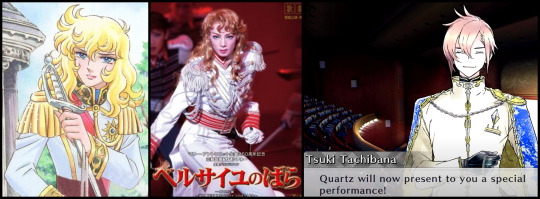
I would strongly encourage you to browse their official English Language site (or Japanese one, if you can read it), which can be found here : Takarazuka Revue
While you're there, if you're there for Jack Jeanne reasons, it may be interesting to pay attention to the use of the word "dream" which is one of the theme/motif words of Jack Jeanne, and is use heavily in Takarazuka's official material as well as writings on the subject.
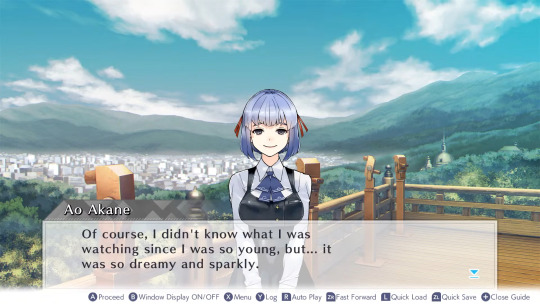
Had to throw this in because these? These are the Takarazuka words right there. Well, their official Motto is "Modesty, Fairness, Grace" or "Be Modest, Be Proper, Be Graceful" (which is a whole lot to unpack elsewhere) but unofficially it could be "So Dreamy and Sparkly."
You'll probably get a more thorough history on the website, too, than I provided.
Rather than make this even longer, I'm going to make a separate post on Takarazuka Music School, the path into Takarazuka, and it's similarities and difference with what we know about Univeil.
I'm by no means an expert of Takarazuka, and I should probably defer to people more involved in the fandom for that, but if anyone has anything to add that I missed in this brief post, please please reblog and add! If you have any questions, I can try to answer, asks should be open!
#explainer#jack jeanne#my posts#this is intended to be a series hence the title#if I've made some zuka fandom faux pas here please let me know!#i do not pretend to know all the rules#takarazuka
33 notes
·
View notes
Text
im like, what, 10 years late to the whole walking dead game thing but i was way too young back then to understand the game. i hope people still enjoy it, its a really good game (and sad) but im only up to season 3 right now (i only really liked s1 and s2) but im not finished so i cant really make decisions rn
i just want to talk about ben rn and evaluate him cause im rewatching it and now that hes my favourite i notice more things about him now. (i literally look at him everytime hes in frame even if its just showing the back of his head oml)
but anyway i see a lot of ben hate and sure i get it but i dont at the same time ben is so silly how can u hate him
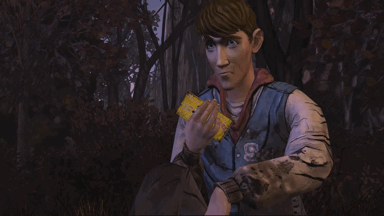
- to start, when we first met ben in the woods, he’d already been through some stuff, like he saw his classmate off herself and turn into a walker, his camp got raided and he was left with 1 friend and his teacher (who both still die btw) so most of what he had left before the apocalypse was gone
- when lee is rationing out the food, if he gives ben food first, kenny comes and tells lee that there’s kids that need food too, and ben literally is like ‘sorry i didnt want any trouble’ like cmon, and he’s literally a kid too he deserves the food as much as anyone else
- on the train he is interested in the controls and being up there, so we can see that he generally enjoyed it. but once lee gets the engine going, kenny comes and ben immediately has to go babysit katjaa clem and duck (he is also visibly upset) AND THEN later on lee asks how ben was doing and he says ‘im watching the girls and not working on a mega cool train’ (let him on the train immediately 😠😠)
- ok, so maybe he did sneak supplies to the bandits and i think this is just me being biased but i feel like him giving the supplies held off the bandits a little. i mean think about it, they moved on from the st john’s farm and started taking from the motel, right? im not sure how the bandits asked ben (if they made it clear then i forgot) but if he refused wouldnt the bandits come attack even earlier? i mean they needed the supplies right, and if ben didnt give them anything to begin with they would have raided the motel anyway. i mean they knew where they were even before the st john incident. idk its just a thought
- i think it was cool how ben managed to confess to lee that he was the one who slipped the bandits supplies. like you can tell ben is a good guy cause the guilt was almost literally eating him from the inside. and even though ben isnt one of the bravest people, he still confessed knowing that lee’s reaction wouldnt be pretty. (also his stance when leaning on the train railing was so silly to me)
- after they meet christa and omid, ben tells lee that his biggest fear was to be eaten by the walkers. i mean he literally said that if he got bitten he would off himself 😢😢
- also ben was always referred to as a child but he was never treated like one, everyone excpected him to be brave and strong but in reality he was just some scrawny highschool student who was scared and couldnt live up to his impossible standards. man, i really just wanna give ben a big hug
- if you tell ben to “kill anything that gets in” he responds with “you know you’re talking to me, right?” poor ben
- even though his biggest fear is getting eaten by walkers, you still have the option to leave him behind, and let him go at the bell tower. i mean how could u do this to him hes already gone through enough
- lastly, the part where ben tells off kenny is literally iconic, that scene singlehandedly made ben one of my favourite characters of all time, i was like everyone else, i didnt care about ben because i thought he was a bad guy since i never really payed attention to him. but i swear when he was telling kenny off it felt like i was being told off too. i mean his point was valid too, kenny had his family to say goodbye to, and ben (and literally everyone else) never got to see their family, (or they saw them as walkers, lee and clem,, :( )
- i know the last point was meant to be the last one but cmon its ben i could type this for ages longer but yeah. he had the literal best character development in the game. at first he was some stupid kid who was always messing up and before he died he was an amazing character who deserved literally everything. omg i cried so hard when he died cause when he fell i was like, oh i think its ok the fall wasnt too far and he said he only hurt his leg, but bro once we saw what really happened my heart sank bro it was so sad i really hoped nothing bad happened to him ☹️☹️ but i think kenny did the right thing cause like we said, his worst fear was the walkers getting to him. gosh i feel like i watched his death for the first time ages ago and i still cant stop thinking about him man
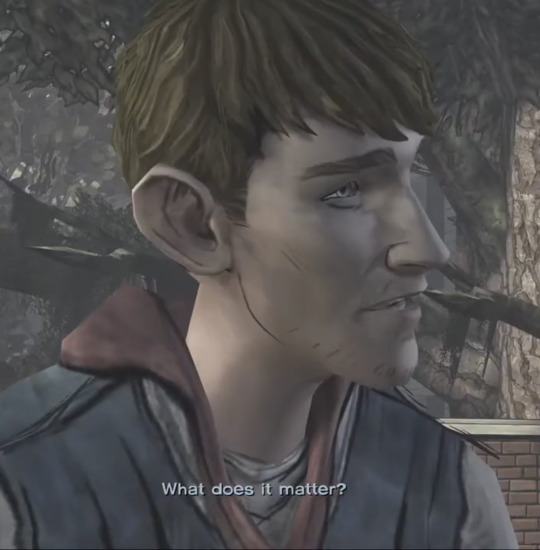
anyways, i would literally do anything to give ben a massive hug, he did his best and he was literally so funny too :((
(thanks if u read this far btw, i just wanted to rant about this man i love him so much and i will defend him with my life) 😠‼️
#ben twdg#ben paul twdg#the walking dead game#twdg#ben paul#twdg lee#twdg clementine#twd#telltale games#twdg kenny
121 notes
·
View notes
Note
I would like to share my perspective about Horde Prime’s dinner scene and showing colonization via food in SPOP’s final season.
Horde Prime is further seen as evil for serving food from a planet that he colonized and destroyed, and it’s supposed to be a thoughtful and deep but subtle insight into Horde Prime as a villain who should be condemned. Catra has no problem eating this food, and I think the writers meant this to signify that she wouldn’t initially succumb to Horde Prime’s mind games like Glimmer, who starts hyperventilating in horror (You know, before Horde Prime told her that she’s not even a player in his game, but with the writers’ favoritism of character and shipping, as per usual, with Catra clawing the table and that talk about “elevated heart rate” and “dilated pupils” for Adora when she was shown on Horde Prime’s live robot feed).
It really reads to me that, like Horde Prime, Catra feels no weight of guilt from taking lives and what those lives once owned (unlike Glimmer, who actually cares about the colonization of her planet, as well as that planet that was destroyed by Horde Prime), as a fellow colonizer and destroyer. Like, it’s not because she has a better poker face than Glimmer, it’s because she literally does not care, and thus does not react to Horde Prime’s statement.
This “sensitivity” to colonization via food is another double standard. This perspective of colonization and consequence is completely blind to Catra, despite it being highlighted via Horde Prime; I am specifically referring to when Catra joins the others in the spaceship to eat the food that Glimmer said she and Angella used to make together. Catra does not deserve to partake in anything positive pertaining to Angella’s memory: she attempted to destroy the Moonstone, colonize Bright Moon, and killed Angella. She does not deserve to eat the food that Angella used to make with Glimmer, and she does not deserve to live in Bright Moon (a disgusting implication shown in Adora’s supposed dream of the future).
That’s all for now 💞.
i never thought of this but yes, that describes catra's character perfectly. we only see her feeling mildly guilty about the way she treated adora, scorpia and entrapta. we never see her considering the weight of what she did in the horde, the lives she ruined. she never cared about the civilians and she certainly did not care about what horde prime did to them, because at their core, they were the same kind of person. controlling, apathetic and cruel.
again, we can take zuko for comparison here. zuko isn't just guilty about trying to capture aang. he is shown to be very clearly guilty about the way he harmed other innocent civilians and about what the fire nation did as a whole. even though he didn't take part in the war directly, he still takes responsibility for what the fire nation did. his confrontation with ozai says it all. he could have just been like "i'm leaving to join the avatar" but he stayed and pointed out the effects of the war and how the fire nation has brainwashed its citizens into thinking that they were doing something good.
and there's build up to this. throughout the series, zuko meets and interacts with various civilians, all with their own story of how the fire nation ruined their lives. song shows him a scar she got during an attack, jet confides in him about how his family was killed when he was little, lee (the little boy in zuko alone) is almost recruited into the army forcibly, just like his brother was. ATLA does a fantastic job of showing us how war affected everyone, not just the heroes and villains. and through this, zuko's conscience is unraveled more and more until he decides to take a stand.
meanwhile, spop has the theme of war as a pretty backdrop. they give no importance to it whatsoever and catra, who did way more damage than zuko ever did, isn't even shown to be guilty of partaking in the war. she doesn't have to answer to how she conquered salineas or how she invaded a village in s1, nothing. it really makes me wonder what the civilians in spop thought of her. is it just "oh she's she-ra's girlfriend now so i guess we can't say anything"?
#this analysis was really good btw op!#and YES catra did not deserve to partake in anything honoring angella's legacy#what the actual fuck were the writers thinking?#spop critical#spop#spop salt#spop discourse#spop criticism#she ra#anti catra#anticatra
52 notes
·
View notes
Note
Going back through TOH's episodes, it strikes me how boring they are. Part of the problem seems to be how criminally unfunny the show is, generally speaking. I can count how many times I've laughed on one hand. In fact I can list them:
There was the "It's been my dream since I was a boy" guy pushing kids off cliffs (Moving Hassle), Luz's "He'll be fine" after throwing Hunter overboard - and then his subsequent re-entry (Hunting Palismen) - and lastly Luz tumbling offscreen in front of Amity after a spider crawls on her face (Grom). That's 3 scenes, 4 jokes if we're being charitable. And sure, maybe my sense of humour is just incompatible with TOH's and I'm being harsh.
But I can't deny that I just feel like there's no rewatch value in TOH? Like it's just... the jokes are so bad to the point it's not fun, it's not entertaining, it's a slog, I see no value in retreading the same ground. And I am a SERIAL rewatcher! This is coming from someone who spends maybe 85% of their time experiencing the same stories! I love seeing well-done media all over again, because even if I know what's going to happen or what they will say, a well-structured joke or a skillfully delivered line is still gonna engage me.
I can't even recommend the show to anyone because I HAVE in the past... and what ends up happening is they watch the first couple episodes, get bored, go "I recognize that you like this, but it's not my thing" and drop it. And I CAN'T BLAME THAT! Because that's how I reacted too when I got into the show! I only stuck with it because it seemed like it was going really interesting places. And it tried to, I think, and failed.
I'm also a very fandom-heavy person so TOH's boring episodes have made it increasingly harder for me to stay within it. Because I'm not rewatching anything, I can see myself in real time as I forget more and more of the plotlines, and even a lot of the characters. It's just... kind of disappointing. It's like I just had a gradual fizzling out of interest. I don't even hate the show, which might be better in some ways - instead I just can't muster enough shits to feel any type of way towards it.
I rambled a bit but I guess my ultimate ask here was: what are your thoughts on whether or not TOH manages to entertain new/old viewers?
So I like S1. I think the characters are what carry it and that they are at their most interesting, EASILY, in S1.
The vast majority of S1, in terms of concepts and executions for plots, is OKAY AT BEST.
This actually just comes down to a simple tonal decision of TOH and also just the fact that a boring world with boring magic creates little to do with bog standard plots and TOH actually has a LOT of bog standard plotting. It is a pretty classic story structurally and takes genuinely very few risks in the structure... Which is okay in theory.
There is nothing wrong with not reinventing the wheel and TOH talks a big game about subverting tropes but no. As a fantasy fan, I can tell you this is EXCEPTIONALLY normal. Like... Insultingly from how much it talks a big game. Especially because if you're going to do classic, you have three options: Shoot the moon, lean into the unique elements of your concept or do it VERY. VERY. WELL.
And remember: They did a body swap episode and it is one of the most hated episodes of the entire show. That's not a good sign.
But this touches on the second problem I brought up: This is a boring world with boring magic. Because TOH's fantasy world is so basic, has little magic and little flair with its magic, it inherently limits what it can do. Now, it doesn't have to be this way but the show made it this way with how little we see of it, how limited it is (like how plant magic is 99% vines), and how often it just blatantly makes one to one comparisons between it and our world with effectively NOTHING altered like how the covens are just jobs, right down to them being introduced through a job fair and a boring one at that.
So when we look at a classic episode concept like the body swap episode, the three plots are... Easily replicated elsewhere. One person gets in trouble in the swap's job because they don't know what they're doing (with the most unique twist of this actually landing them in prison), a classic animal plot where they're taken in by a place that seems cozy and then isn't with literally no changes, and finally... Teenager pisses off bullies and agrees to jump DEAD MAN'S GORGE! But instead of skateboards and people really building it up, its rat beasts.
None of these plots are actually bad, they're go tos for a reason, but... No one is bringing anything special to this. Luz is entirely ignored so her character may as well not matter, Eda is doing NOTHING to add to her plot and King... King is fun for about two minutes leading the bullies and otherwise is just any other character in this situation. It's not bad, I personally enjoy parts of the episode... But it's nothing special. From the second the thing that X character is going to do is revealed, you can guess every step of the plot and they don't even really throw in good jokes in the process. A couple jokes but nothing memorable because everything is weirdly subdued compared to how other shows would be, even in an episode that is definitely trying to be more over the top.
And this runs into the inherent tonal issue of TOH: It doesn't want to be an adventure comedy. Those are genres that are commonly really over the top. They hear jump the shark and go "How about a shark jumping ten other sharks in order to finish making a can of tuna for their fire giant overlord?" And the face of this fact, in that the genres it pitches itself as for the first two episodes!
TOH flatly refuses to be silly and over the top. It's characters are very... 'realistic'. I don't mean real, just that they're meant to feel more mature by being more in control. They don't let them interrupt each other for a joke, they don't let a character be potentially OOC for a one off gag like Hop Pop screaming "EAT THE RICH!" or Sprig asking "Have you ever killed a a man, Hop Pop," and I can only think of one time Luz got mad for the sake of a joke and honestly, yelling about the Rusty Smidge barely comes across as a joke because of how genuine the anger feels after a point. Otherwise, stuff that would normally get exaggerated frustration or the like to at least let you laugh at the reaction just... doesn't get one, like how Luz yells about Luzura being killed off but then... Just walks off and is passive aggressive mostly instead of even exasperated. For a drama or romance, this is not a bad approach but for even just an adventure kid's show... It's not great to put it mildly because people meet odd situations with weird levels of nonchalance. Not quite irony poisoned levels but getting there.
It's why TOH is mostly remembered for the romance and drama episodes. Not only do they allow some of the romance scenes to actually include melodrama, they also just fit how the characters act better. It's why Amity has some of the biggest emotions of the series and why Lumity have such great lines between each other because they're actually willing to lean into the sort of genre fiction that they're doing. This is also why S2 works better than S1 because a lot of the pretense of being a comedy adventure gets dropped but like... There's still plenty of boring in S2 with stuff like how Elsewhere Elsewhen takes time travel and includes a couple jokes at the beginning and then is just... horribly bland and barely qualifies as an adventure.
This lack of allowing people to be emotional and jokey also leads to the reliance on comic relief characters. People like Gus, King or Hooty, or S2 Lilith, who the characters can mock in someway, including the writers. Characters who can be the punchline even if it means a lot of people come off a lot meaner than they should, i.e. Luz absolutely rejecting Hooty for the vast majority of the series despite supposedly liking the weird and rejected. That also means that most of the time they're not on screen, either the scene starts getting pretty dry or you have a character suddenly warp to be comic relief, like how Eda gets in some S2 episodes like Elsewhere Elsewhen or Eclipse Lake where suddenly she's MUCH more of a joke than she normally is and also REALLY bad at it too and seeming potentially brain dead for it. Thanks to Them even does this to Amity even though she is probably the last person in the cast to make sense as a sudden clutz.
All of this stuff makes it so that if you go in wanting a kid's show, a fantasy show, ANYTHING that is pitched in the first episode... S1 is going to be just okay to you. I enjoyed it... But I also fell off when I first watched it. I thought the characters were good but none of it stuck with me as actually memorable and I watched until I think Adventure in the Elements. I never was never compelled to come back until Lumity animations (literally THE Little Miss Perfect animatic that is nowadays probably hard to find actually) made me go "I remember this show being neat." And Lumity was what kept me, not because I was generally laughing or calling these episodes something special. In fact, that sense of unsatisfaction is probably why I watched through it faster than Amphibia. No one episode of TOH is really great to watch on its own because... It's just kind of boring, or like half of it is boring because the B plots across the board are SO BLAND. S1 or 2 for that matter since Lumity starts getting boring B plots like with the archives or finding out the author of Azura. Both concepts btw that could have been really interesting setups and instead... If you're not into blushing Amity, get FUUUUUCKED.
That's without getting into REPETITION. Repetition kills comedy so King having one joke for S1 and also taking up like half of the B plots for the first ten episodes means you are going to be in agony eventually anytime someone talks to him because you know where it's going and you have DEFINITELY heard this joke before. And you know, he also gets three repetitive B plots which just hurts the joke even more, even as they try to make twists on it, and hurts the feeling that the show is doing... Anything..
It's just not good. Which is probably why once the characters and the 'subversive/unique' elements of the show both weakened, more and more people left because... Why would you keep watching this then? Those elements are what made up for boring plots with boring execution in a world that didn't allow for more interesting storytelling because it had few ideas and expanded on NONE OF THEM. So of course people pitch it using the elements that say "this isn't like other kids shows/fantasy shows" because if you pitch it to people who like those... They'll just be disappointed eventually and bored quickly. Like i think a lot of people did to be quite honest.
And a lack of creativity, and a lack of genre understanding, isn't something time could have ever fixed.
======+++++======
The short version of proving this point btw is going "Compare Bumi's introductory episode, which is a character giving three trials to prove another's worth, versus when the Bat Queen challenges Luz. One is exceptionally funny, interesting and has genuinely interesting twists while the other is... There. So very there. Painfully just... there. Not even bad, just... There.
Also, yes, comedy is extremely subjective which is why I tried to talk more about how a lot of these premises are boring because that can be a bit more objective.
I have a public Discord for any and all who want to join!
I also have an Amazon page for all of my original works in various forms of character focused romances from cute, teenage romance to erotica series of my past.
I have an Ao3 for my fanfiction projects as well if that catches your fancy instead.
If you want to hang out with me, I stream from time to time and love to chat with chat.
A Twitter you can follow too
And a Kofi if you like what I do and want to help out with the fact that disability doesn’t pay much.
35 notes
·
View notes